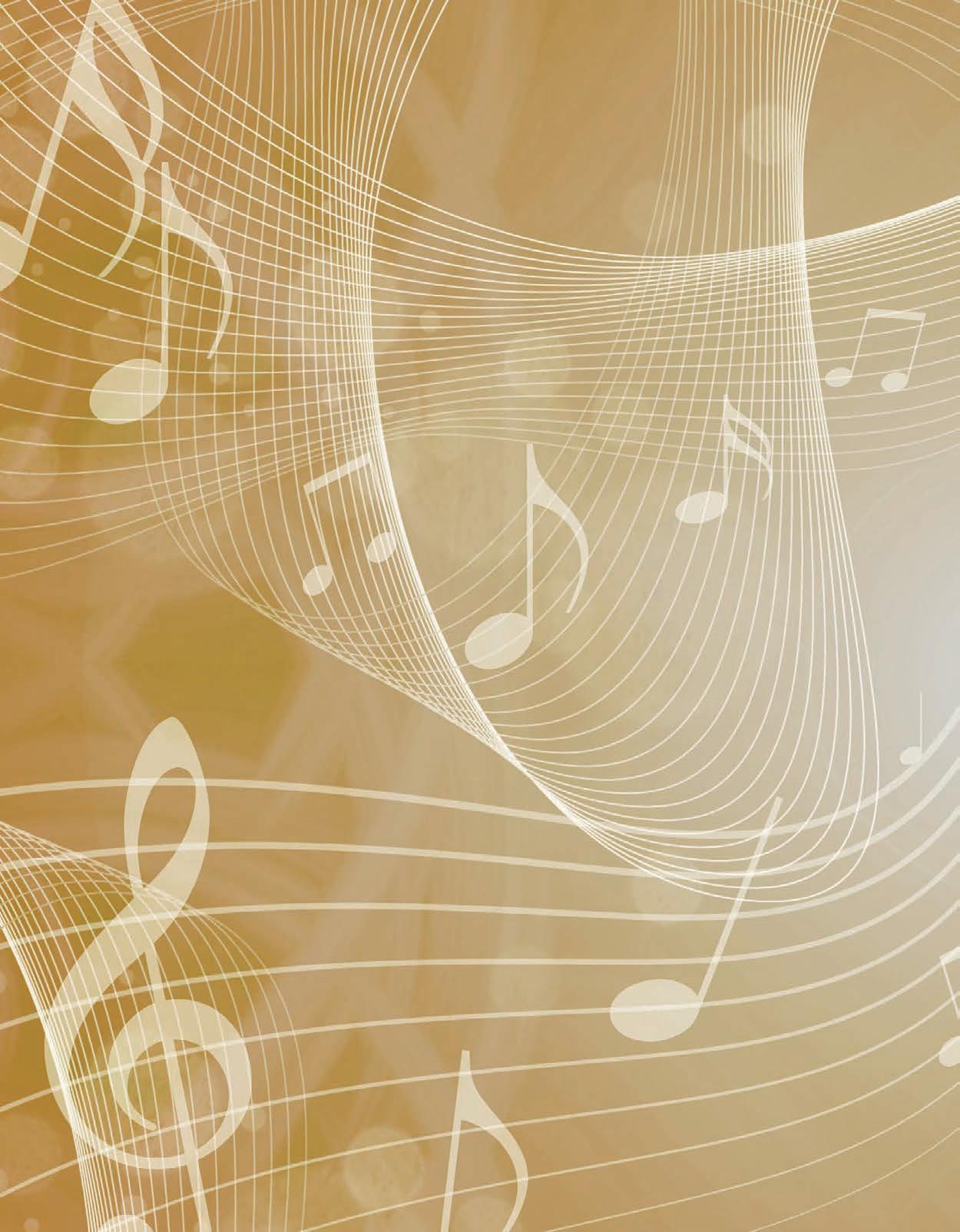



VOLUME 78, No. 1 OCTOBER 2023 Accessible Music Education Tech Tips for Elementary General Music "Ain't-a That Good News" Podcasting Across the Curriculum Region Jazz Band/Choir Audition Info and much more! The Official Magazine of the New Jersey Music Educators Association a federated state association of the National Association for Music Education



TEMPO 2 OCTOBER 2023 The Department of Music is an accredited institutional member of the National Association of Schools of Music (NASM) as well as a collegiate member of the National Association for Music Education (NAfME). Programs of Study B.A. in Music B.M. in Performance B.M. in Music Education Minor in Music Minor in Music Technology Minor in Theatre music.tcnj.edu Academic and Performance scholarships available US News & World Report Regional Universities North public college #1 Make Music. Make a Difference. Creativity. Scholarship. Artistry.
TEMPO Editor - William McDevitt 300 W. Somerdale Road, STE C Voorhees, NJ 08043 Phone: 856-433-8512
e-mail: wmcdevittnjmea[at]gmail.com
Deadlines
October Issue - August 1
January Issue - November 1
March Issue - January 15
May Issue - March 15
All members should send address changes to: mbrserv[at]nafme.org or NAfME, 1806 Robert Fulton Drive Reston, VA 22091
Printed by: Mt. Royal Printing 1-717-569-3200
The New Jersey Music Educators Association
TEMPO
Volume 78, No. 1 http://www.njmea.org OCTOBER 2023 4 President's Message - David Westawski 10 News from the Board of Directors 22 A New Name: Accessible Music Education - Maureen Butler 24 Tech Tips for Elementary General Music Class - Amy Burns 28 Beyond the Conference: Following Up on QuestionsDrew X. Coles & Megan Reilly 30 Music Down the Hall: The Positive Impact of the ArtsDr. Larisa Skinner 34 "Ain't-a That Good News": Lessons from Uzee Brown's Solo Voice Concert Spirituals - Jameon D. Moss 38 Podcasting Across the Curriculum - Marjorie Lopresti 43 Region Jazz Band and Jazz Choir Audition Requirements Advertisers Index & Web Addresses...62 All-State Band Solo List.......................42 Board of Directors...............................59 Crescendo Foundation...................20-21 Editorial Policy & Advertising Rates....60 Executive Director's Message...............8 In Memoriam......................................54 NJAJE Jazz Conference..........................7 NJMEA Awards....................................56 NJMEA Past Presidents.......................60 NJMEA Year-End Financial Statement...9 Past President's Message......................6 President-Elect's Message.....................6 Resource Personnel.............................53 Round the Regions.........................49-51 FEATURES DEPARTMENTS AND NJMEA BUSINESS FORMS AND APPLICATIONS Please go to njmea.org Click on the desired activity for downloadable copies of all their forms & applications
is a state unit of the National Association for Music Education and an affiliate of the New Jersey Education Association. It is a nonprofit membership organization.
(ISSN 0040-3016) is published four times during the school year: October, January, March and May. It is the official publication of the New Jersey Music Educators Association. The subscription rate for non-members is $20.00 per year. The subscription for members is included in the annual dues. A copy of dues receipts (Subscriptions) is retained by the NJMEA Treasurer. Inquiries regarding advertising rate, closing dates, and the publication of original articles should be sent to the Editor.
78, No. 1, OCTOBER 2023
Editor
William McDevitt C/O NJMEA, 300 W Somerdale Rd,
C, Voorhees NJ 08043 Periodicals Postage Paid at Lakewood, NJ 08701 and additional entries
Please forward address changes to: NAfME 1806 Robert Fulton Drive Reston, VA 20191 EMAIL/ADDRESS CHANGES Please go to nafme.org to record email and address changes.
Volume
TEMPO
-
STE
POSTMASTER:
President's Message
David Westawski West Windsor Plainsboro High School - South westawski.njmea[at]gmail.com
Welcome to the 2023-2024 school year! I hope this message finds you settled into your year after the excitement of another busy September. Before I go any further, I want to thank Wayne Mallette for his service as President. Wayne took the helm two years earlier than expected and led the organization with distinction and an admirable, quiet calm. I’ve learned a great deal from him and look forward to the guidance he’ll now provide as our Past President. I’d also like to thank and recognize Patrick O’Keefe who concluded his term as Past President after dedicating six years to NJMEA. We’re fortunate that Patrick has agreed to stay on as Band Performance Chairperson. I’d also like to welcome Yale Snyder, PresidentElect, to the Board. Many of you already know Yale through his work as Percussion Chairperson and Past President of CJMEA. I look forward to working with the Executive Board as we continue to create quality learning and performing opportunities for the music educators and students of New Jersey.
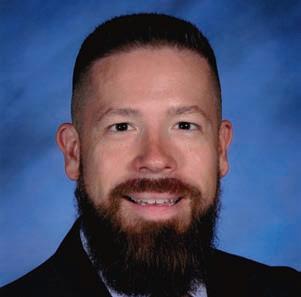
Board Updates
In July, the Board of Directors met for its summer reorganization meeting. Two notable changes are the addition of an Emerging Ensembles division, chaired by Zachary Gates as well as elevating our Diversity, Equity, Inclusion, and Access (DEIA) committee to a Board-level division chaired by Isaiah Mason. We’ve also invited the NJ NAfME Collegiate President, Riley Aviles, to sit on the Board as an observer. Finally I’d like to welcome Preston Wilson who has graciously agreed to serve as our Higher Education/Collegiate Chairperson.
In order to increase our collaboration with other organizations, we’ve also created an Affiliates Roundtable that will meet quarterly to discuss issues that
collectively impact us. Current members include NJACDA, NJ-ASTA, NJAJE, Guitar Education, NJ-CBDNA, and the New Jersey Symphony. We have a few other Board changes that are still being worked out at the time of this writing.

Year One Priorities
At the summer meeting, I laid out my top three priorities for this year to the Board. I’d like to briefly share them with all of you as well.
1. Communication and Transparency
In an effort to improve the consistency of our communications, we’ve standardized our TempoExpress to be a weekly newsletter sent out each Wednesday. This dedicated newsletter will continue to deliver relevant information to our members consistently on the same weekday. Email addresses for our emails come directly from NAfME, so please be sure your information is correct in the member portal.
The Sunday after Labor Day, we began our Sunday Office Hour initiative. Members of the Executive Board, Board of Directors, and special guests will be on hand from 7:30pm-8:00pm each week to answer questions and offer face-to-face time with members. This provides a valuable opportunity for us to address inquiries, and more importantly, serve as a resource to support our members. The Zoom link and the attending representatives for the upcoming Sunday will be included in the Weekly TempoExpress. I encourage you to drop by, even if it's just to introduce yourself and say hello.
Lastly, we're working to elevate our presence on social media platforms such as Facebook and Instagram. For those of you who engage with social media, you understand the time and effort it takes to cu-
TEMPO 4 OCTOBER 2023
rate, refine, and manage content. I will be furnishing an update on this initiative in the upcoming editions of the Weekly TempoExpress.
2. Expanding the Tent by Expanding our Offerings
NJMEA has done great work with the Big Three (choir, orchestra, and band) for almost 100 years. But now we’re looking to bring in even more teachers and students by expanding what we offer. The first step in that process was to add the Emerging Ensembles division to the Board. I struggle with that name because these ensembles are only new to our organization having existed for decades in other venues. The first addition will be an Honors Modern Band at our February conference. This follows the inclusion of modern bands at both the National and All-Eastern levels last year. It’s important to note that the addition of these “new” ensembles serves to supplement what we already do and not to supplant the Big Three. I’m excited for what the future holds and the new ways we can engage teachers and students through our offerings.
3. Evolving and Elevating our Work
For those of you who know me, you know that I frequently ask, “why.” I do this for two main reasons. The first is so that I can more fully understand a particular issue or problem by asking questions. Second, and perhaps of greater significance, is to delve deeper into the origins of decisions, policies, and procedures. It’s comfortable and easy to lean on “we’ve always done it that way” or “that’s what the policy says.” Sometimes, the policy or procedure as written makes sense in our current reality. However, there are instances when a fresh approach might be more appropriate. The notion of contemplating novel (and potentially improved) methods or being receptive to change can be unsettling. I acknowledge that growth
and change pose challenges, yet the rewards are often substantial. As I mentioned earlier, NJMEA has done great work for almost 100 years. Posing the "why" question empowers us to assess matters critically, enhance the quality of our efforts, and secure our relevance and excellence for the next century.
Strategic Plan
This year will also see the formal revision of our strategic plan. Jeff Santoro, our Past President (20172019) has agreed to serve as the facilitator for this process. The thoughts, concerns, and priorities of the members will be integral to this revision process, so please keep your eye on the Weekly TempoExpress for more information as we begin this exciting process.
I'm truly humbled by the privilege of serving as the President of NJMEA for the next two years. My aspiration is for us to continue advancing the remarkable accomplishments of our organization while collectively charting a path for the future of music education. I wholeheartedly encourage you to connect with me or any fellow Board member to share your questions, insights, and thoughts. The vigor and strength of our organization stem from the creativity, innovation, and active participation of our members.
In this spirit, I invite you to consider deepening your engagement with NJMEA. Within an organization of this magnitude, there's always room for individuals who seek to contribute. Your dedication to advancing music education in New Jersey is sincerely appreciated. Thank you for the invaluable contributions you make.

OCTOBER 2023 5 TEMPO
Past President's Message
Wayne Mallette Scotch Plains - Fanwood mallette.njmea[at]gmail.com
Happy New School Year!
I hope your school year is off to a great start! It is my pleasure to greet you in my new role as Past President of NJMEA. This wonderful organization has provided guidance and professional development to music educators throughout the state of New Jersey. This upcoming year marks the 100 anniversary of this organization. This exciting milestone will be marked throughout the year, and I hope you get a chance to be a part of one of the celebrations.
In this role as Past President, I look forward to supporting our President, David Westawski. The organization is in great hands, and I am confident he will continue leading us with passion and vision. I will
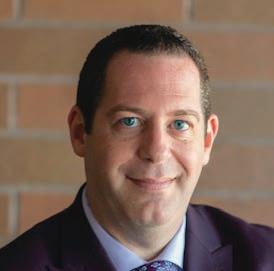
also continue to advocate for equity and access for students and teachers from underrepresented and marginalized communities. If there are any ways you feel that I can support what you are doing in your district to expand access to music education, please let me know.
As an organization, we continue some of our exciting partnerships with state organizations such as Art Ed NJ, the New Jersey Symphony, and the New Jersey American Choral Directors Association, just to name a few. NJMEA remains committed to maintaining and expanding our partnerships.
Best of luck with all your plans and endeavors for this new school year!
President-Elect's Message
Yale Snyder Monroe Township snyder.njmea[at]gmail.com
I hope everyone is well and having a great start to the new school year! In July, I started my term as the new President-Elect of NJMEA. I am so happy to be in this role to serve all of you and continue to push the organization forward. I am honored to be working with everyone on the NJMEA Board and supporting David Westawski as he is now in his role as President. During the next 2 years, I am looking forward to continuing to learn the ins and outs of the organization and be a


helping hand to each division. In addition, I am most excited to getting to work with all of our members. Our conference in February in Atlantic City will be one not to be missed and I hope to get to see many old and new faces there. If I can be of assistance to anyone on how the organization can best serve you, your students, and your programs please always feel free to reach out. Thank you for putting your trust in me as I begin this new journey. I look forward to seeing you soon!

TEMPO 6 OCTOBER 2023
The New Jersey Association for Jazz Education presents the 19th Annual

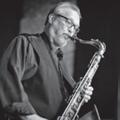

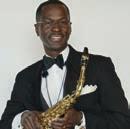


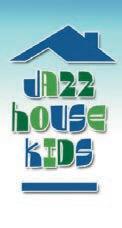
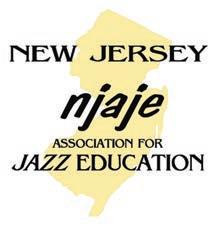
New Jersey State Jazz Conference
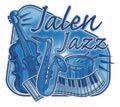

Friday, November 17, 2023
NJPAC Center for Arts Ed ~


shares tips and lessons from his distinguished 50 year teaching career


Free to all NJAJE Members
Non members: $75 includes 1 year NJAJE membership and Downbeat Magazine ~



Join us for the All State Jazz Choir and Jazz Band at 7:00 PM (Tickets available from NJPAC) With special guest Stefon Harris
and
featuring instrumental and vocal adjudicators from the NJAJE Festivals

Leala Cyr, Mark Gross, Sherrie Maricle, Gunnar Mossblad, Brenda Earle Stokes, Wilbur Witteman; Dr. Jeffrey Kunkel, Moderator
the industry's best New Jazz Band Music Reading Session
with Joseph Verderese ~ New Vocal Music Reading Session with Randy White
Please join us as at the luncheon as we honor the 2023 NJ Jazz Education Achievement Award recipient
Register by Monday, November 6 at www.njaje.org or contact Conference Chair
Jeffrey Haas
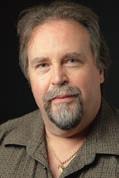
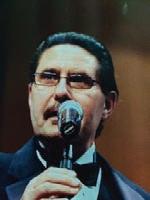
(201) 207-6736
jhaas.njaje@gmail.com

Professional Development Credit Issued


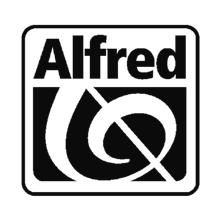

OCTOBER 2023 7 TEMPO
“Some Secrets to My Success”: Andy DeNicola
Doug Heyburn
"Perspectivesfor Preparation
Performance"
Executive Director's Message
William McDevitt wmcdevittnjmea[at]gmail.com
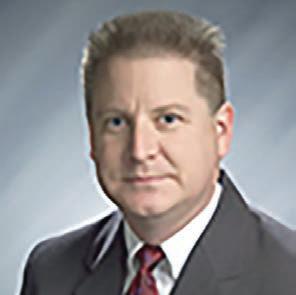
The 2022-2023 fiscal year has been a rough ride for everyone and NJMEA is no different. As you scan through the financial report on the opposing page you will notice that our outcome did not come close to our projected budget. Our income was well below our expenses. We are in a fortunate situation that Debbie Sfraga started investing excess funds decades agoknowing that we would need it at some point. Last year we hit that point.
When we went to the National Assembly in June, I had the opportunity to sit and talk about our state with many Executive Directors from other states. While financial discussions were not cheerful ones, it was good to hear that every other Executive Director was facing the exact same situation with many of them in much worse positions. Hopefully, things will stabalize this year and next year's report will have a much happier tone.
Because of last year's large deficit, the Executive Board has approved some fee changes and budgetary cuts for this fiscal year.
NAfME/NJMEA Dues - NAfME (who is seeing the same financial situation as all of the states) has raised membership dues $2. NJMEA has also raised our portion of the dues $2. It has been more than 10 years since we have raised dues. Many states have made larger increases than we have. In fact, dues for NJMEA members ($133) are lower than 60% of the rest of the states - which range from a high of $166 to a low of $122.
All-State Fees - You can see on the statement that our All-State fees did not cover expenses. We have raised the participation and housing fees to make up the losses that we have seen. Almost every part of the All-State experience has seen increases in costs which we have absorbed in the past. We are at the point where we can no longer absorb. Looking at the fees that neighboring states charge, we are still lower than many.
Conference Registration - There has been a slight increase in the Conference Registration fee.
Board of Directors Cuts - We have made budgetary cuts for many of the BOD line items. We are also making Committee Chairs responsible for their budget. We have leased a photocopier to decrease our printing costs. We are requiring quotes for some of our major expenditures. We have asked our Board to find savings in all areas of their budgets.
Conference - When our members come to our Conference they expect a certain level of service and quality. We have done our best to maintain that for decades. When we assessed our spending we took a hard look at our Gala Concert on Friday evening. Last year's concert "Naturally 7" was an amazing experience. Unfortunately there were only about 150 of the conference attendees present in the audience. We have decided that the expense of bringing in a headliner has gone beyond what we can afford at this time. There will still be a concert, but our budget for the event has been trimmed significantly.
TEMPO - Last year we made some changes to TEMPO that helped bring it closer to budget. Most members probably didn't even notice the changes. We will continue to look for ways to cuts costs in this area.
We know that everyone is feeling the pain of price increases and we are doing our best to maintain the high level of service that our membership deserves while following a budget that continues to be increasingly more difficult to balance. We are hoping that the cost cutting measures and fee increases that we have made will result in minimal hardships for our members and bring us back to a more stable outlook, just like other states are hoping.
Just like the beginning of a each new school year brings a sense of excitement, so does the beginning of NJMEA's new "school year". Let's celebrate the start of the new year and 100 years of NJMEA!

TEMPO 8 OCTOBER 2023
NJMEA Year-End Financial Statement
OCTOBER 2023 9 TEMPO INCOME Advertising in TEMPO 30,335.25 AS TC/Bands-Hou/Meal/Trans128,169.35 AS Inermediate Orchestra 7,623.25 AS Bands 16,118.44 AS Chorus - SATB 22,725.00 AS Chorus - TC 5,670.45 AS Coordinator 193,040.54 AS Jazz 1,260.00 AS Orchestra 8,915.00 Composer Competition 260.00 Elementary Honors Choir Festival 14,384.03 February Conference 178,293.10 Grant 4,000.00 Guitar Festival 5,758.25 Marching Band Festival 7,264.00 Middle School Band Festival 3,300.00 Middle School Choral Festival 2,100.00 Middle School Orchestra Festival 900.00 Miscellaneous Income 2,500.00 NAfME Rebates 62,004.00 Opera Festival 150.00 Summer Workshop 1,030.28 Tech Expo 4,135.00 TOTAL INCOME 699,935.94 EXPENSE Advocacy 3,832.14 AS Bands 23,442.64 AS Chorus 15,859.71 AS - COJ 203,667.50 AS - TC/Bands 145,471.94 AS Jazz 5,959.70 AS Orchestra 13,038.40 AS Intermediate Orchestra 3,004.93 Bank Fees 149.63 EXPENSE - Continued Board Meeting Meals 2,246.00 Board Mileage 2,145.00 Board of Directors 78,945.48 Collegiate 982.10 Eastern Division Planning Mtg 1,983.69 Elementary Honors Choirs 11,542.57 February Conference 182,502.80 Governors Awards 460.00 Grants 0.00 Guitar Festival 5,228.00 Marching Band Festival 5,035.92 Middle School Band Festival 1,777.21 Middle School Choral Festival 2,438.19 Middle School Orchestra Festival 200.00 Miscellaneous Expenses 0.00 NAfME Summer Leadership 481.21 NJRMEA 251.52 November NJEA Convention 856.41 Office Space 8,290.00 Opera Festival 400.00 Orchestra Festival Middle School 1,193.46 Reconciliation/Discrepancies 0.00 Tech Expo 825.00 TEMPO 33,506.60 Uncategorized Expenses 0.00 TOTAL EXPENSE 755,717.75 Net Ordinary Income -55,781.81 Other Income - Interest 0.00 Other Expense - CC Fees/Fed Witholdings 0.00 NET INCOME -55,781.81
ORDINARY INCOME/EXPENSE July 2022 - June 2023
News From the Board of Directors


Choral Festivals
Donna Marie Berchtold firesongwed[at]gmail.com
I hope all of you have had an exciting start to your school year, and your programs are developing with much enthusiasm for this upcoming year!
The 69th Annual NJMEA Middle School – Junior High Choral Festival Dates are scheduled for the spring of 2024. The Festivals are currently scheduled to be held at two separate locations.
• The first event (South Site) will take place at Rowan University on Thurs. March 14, 2024. The deadline for applications is February 8, 2024 (Event time: 9:00 AM – 1:30 PM). A SNOWDATE has been scheduled for Fri. March 15, 2024.
• The second event (North Site) will be held at Rutgers University on Thurs. May 23, 2024. The deadline for applications is Thurs. April 11, 2024 (Event time: 9:00 AM – 1:30 PM).
The application forms will be on the NJMEA web site, however, they can also be found in the January edition of TEMPO Magazine. A maximum of ten (10) registrations will be accepted at each site. The Registration Fee per school group is $150.00 for either site. Please send in a Completed Form, listing your song titles and composers names, along with the registration fee (per the instructions) on the application form.
Each participating choral group will receive written and aural evaluations by the adjudicators, along with a plaque from NJMEA which recognizes the commitment and involvement by the school, its chorus, and the director(s).
Anyone with questions or concerns may contact Donna Marie at: firesongwed[at]gmail.com, or 609-226-7751 (cell)
NJMEA All-State Opera Festival is (On HOLD)!
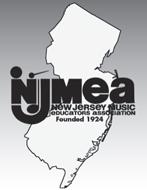
Last year we ran the Opera Festival. We had a small turnout, and sent out a survey after to see if there is an interest in us continuing this event for this year.
We did have some responses to the survey. However, we were expecting a greater response. We have a wonderful team of volunteers who stepped forward to prepare, plan, and rebuild the Opera Festival. Thank you, Anne Paynter (Festival Chair), Brenda Pillari, Dan Marshall (Metropolitan Opera – NYC, NY), Rick Camacho, Kyong Parker, Cathy Cook, Janice Johannessen, and John Leonard. We had a set back in the spring of the year, and therefore are going to hold off on any auditions, which normally would have been in October with the Festival in November. If we run the Opera Festival again in the future, this is what would be expected.
Students will:
•Attend a workshop/clinic on stage performance practice
• Wa tch and/or participate in a masterclass with a Metropolitan Opera Guest Artist/Clinician
• Rehe arse and perform opera choruses with the Festival Choir
• Hav e the Opportunity for feedback and scores from opera professionals and to perform on the Festival Concert (for auditioning students)
• Auditions will be done virtually - Application deadline – TBA, Deadline for Virtual Solo/Ensemble Video Audition Submissions – TBA, Non-auditioning students may attend workshops & participate in the Festival Chorus performance in the closing concert.
We would also alternate the sites between North and South Jersey every other year, however, at this time the Festival is ON HOLD until further notice. Please send me an email if you would like to see it continue, and would be interested in having your students participate.
Thank you very much.
Have a great year!
TEMPO 10 OCTOBER 2023
News From the Board of Directors
Choral Performance
Brian Williams

brianwilliamsemail[at]gmail.com
I hope this message finds you in good spirits after an exciting start to another school year. The all-state choirs have been selected from a very successful audition season last April. I want to take a moment to thank all of the wonderful people who made auditions run so smoothly: First off, Barbara Retzko for being the wizard of all things auditions and Rick Retzko for his help with AuditionForms.com. Next, a warm thank you to our registration managers; Barbara Retzko, Cheryl Breitzman, Kristen Markowski, and Viraj Lal. Next up is Ken Bryson, our choral procedures chair, for steering the ship and keeping everything in line. Finally, thank you to all of our members that helped with auditions!
We are pleased to announce our audition numbers are up significantly from the previous year, thank you so much to everyone who helped their students prepare for the process! Later this month, the all-state mixed choir will come together to rehearse at Rider University before the NJEA conference in November. We are so excited to have Dr. Marques Garrett working with our mixed choir this fall and Dr. Amy Voorhees conduct our treble singers later in February. We are in the process of looking for conductors for the next few years. If you are interested in conducting an all-state ensemble, please refer to the ad placed in the May 2023 TEMPO magazine (all TEMPO magazines can be accessed from NJMEA.org).
Onto some business things… We have started utilizing MailChimp as a way to reach our membership. We understand that some school district’s firewalls will consider these messages as spam and block them before they get to your mailbox. If you have been expecting correspondence from us, either check your junk folder or reach out to myself or the choral procedures chair, Ken Bryson (kennethbryson@gmail.com). If you would like to be added to the mailing list, there is a simple google form on our NJMEA.org website for you to fill out.
I know I have mentioned it a few times thus far, but if you have not been to the new NJMEA.org website recently, it is a sight to behold. If you go to the choir tab under “All-State Ensembles” you will see we have condensed all of the relevant information we send out to students and directors there. There are running documents for both the mixed and treble choirs that are updated whenever there has been a change on our end. These living documents are the most up to date information that we have and I hope that it makes each of your lives easier by having all the information in one easy to navigate place.



Finally, we will have two open choral procedures meetings coming up this year, one at the NJEA conference this November and another at our NJMEA conference in February. These meetings are open to any NJMEA member and will give you an opportunity to keep up to date with what is happening “under the hood.” We hope to see you there!
Have a wonderful rest of your year!
OCTOBER
11 TEMPO
2023
News From the Board of Directors
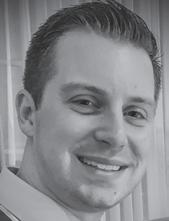
Accessible Music Education
Maureen Butler
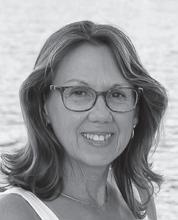
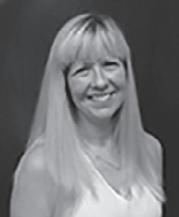
maureenbutlermusic[at]gmail.com
At the July 2023 Board meeting, NJMEA approved the change of the name “Special Learners” to “Accessible Music Education.” This term seems to both reflect the diverse learners that we teach and recognizes our goal to make music accessible to all of them. (See my article in this issue which explains more about this.)
Our state “Accessible Music Education” committee continues to be available to respond to any questions you may have about the students you teach. They include: Steve Braun from the Center of Lifelong Learning and the Academy Learning Center, Lucia Marone from Vineland, Trina McCarthy from Holmdel, Krysta Mirsik from Passaic, Glennis Patterson from Roxbury, Sarah Perry from Westminster Choir College, Lauren Shanahan from the Ellisburg Campus of Y.A.L.E. Schools Inc, Brian Wagner-Yeung from Cuny Brooklyn College, Barbara Weiner from Saddle Brook, and myself. All of us have expertise in teaching students with disabilities, and are willing to share their insight and strategies with you. Many thanks to all of them for their passion and dedication! Feel free to contact the committee through me at my e-mail address.
Administration/Advocacy



Alfred Hadinger
alfred_hadinger[at]nplainfield.org
Welcome to the 2023-24 school year! I hope the start of your year has been filled with positive energy and students who are excited to be a part of your program. The New Jersey Music Administrators Association is looking forward to another action-packed year for our organization, and we invite any administrators who oversee a music program to join us for our regular meetings.
Membership in the New Jersey Music Administrators Association is open to any school administrator whose responsibilities include oversight of a music program. We welcome any principal, assistant principal, or supervisor who would like to network with other colleagues from around the state. More information regarding membership can be found on our website, www. njmaa.org.

PreK - 8 General Music
Amy Burns
aburns[at]fhcds.org
Happy New School Year! I hope that it has been a good start to the new year. As elementary general music educators, please remember to take care of yourself so that you can enter a concert season in good health. We have some wonderful workshops geared towards elementary general music this year. The first one is very soon, on October 9, sponsored by NJSMA with Lynn Kleiner. Stay tuned for more workshops and for the featured presenters at the Elementary Music Academy at the upcoming NJMEA Conference!
TEMPO 12 OCTOBER 2023
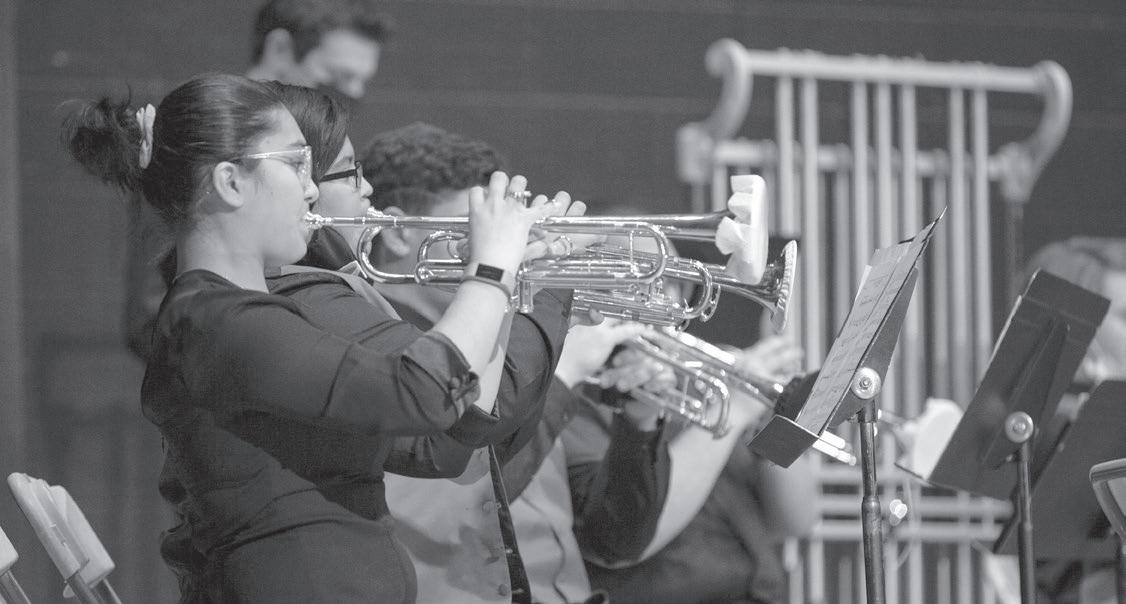



OCTOBER 2023 13 TEMPO B.A. IN MUSIC B.A. IN MUSIC WITH K-12 CERTIFICATION • Outstanding Liberal Arts Program • Accredited by Middle States Association • Performance Opportunities – Wind Ensemble – Jazz Ensemble – Chorale – Marching Band – Opera and Musical Theatre Workshop – Chamber Ensembles: Brass, Woodwinds, Percussion, Strings INSPIRED TO BE HEARD 2023/2024 AUDITION DATES • WEDNESDAY DECEMBER 13 • SATURDAY FEBRUARY 3 • SATURDAY MARCH 2 Scholarships available to majors and non-majors OPEN HOUSE OCTOBER 14 • NOVEMBER 18 caldwell.edu/visit CHRISTMAS SPECTACULAR! With High School Honor Band DECEMBER 8 • 7PM Contact Rebecca Vega for more information. Email: Rvega@caldwell.edu • Phone: 973-618-3446
News From the Board of Directors


Band Performance
Patrick O'Keefe patrickaokeefe[at]gmail.com
Welcome to another school year and one that again promises to be a successful one for our All State students. While I am not new to serving the NJMEA board, I am new in this role and very excited to continue to work on behalf of our students and teachers. For those that I have not met or collaborated with, my name is Patrick O’Keefe and I am a high school band director from Region III, currently teaching at Absegami High School in Galloway.
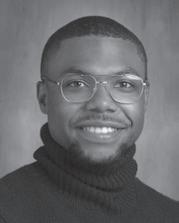
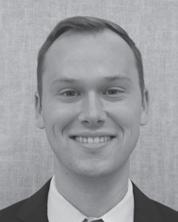
Looking ahead to our All State experience, auditions are set to take place on Saturday, January 20, 2024 at JP Stevens HS. The solo list, first published in this year’s May Tempo, can also be found on the website. If there are any questions regarding auditions, the process, or the material, please always feel free to reach out to me (patrickaokeefe[at]gmail.com) or Tyler Wiernusz, or Procedures Chair (allstateband.njmea[at]gmail.com).
We look forward to another great year, and will continue to share information as the year progresses. As was done last year, we will feature our All State Wind Ensemble and Symphonic Band as a part of the February Conference in Atlantic City, and look forward to their culminating performance at NJPAC in Newark on February 24.
Diversity/Equity/Inclusion/Access
Isaiah C. Mason deia.njmea[at]gmail.com
As we settle into the 2023-2024 school year, the DEIA Committee is excited for the inaugural Student Leadership Conference on November 2, 2023, at Rider University. This conference will provide our students with opportunities to develop leadership skills and explore music-making outside of the standard ensembles found in Western culture (for instance, Modern Band, Chamber Ensembles, Electronic Music, etc.). Specific information about registration will be shared through TEMPO Express.
With the success of our Diverse Repertoire Reading Sessions offered at the 2023 NJMEA Annual State Conference, the DEIA Committee is seeking a Diverse Repertoire Sub-Committte Chair. Look for a TEMPO Express with more detailed information and instructions on expressing interest in this position.
The DEIA Committee wants to hear your success stories! We know that many of you are doing great work in your classroom to promote diversity, equity, inclusion, and access. We would love to hear about your success and be able to provide effective strategies to teachers looking for more resources. Use the QR code or the link to complete a form and share your stories.

https://forms.gle/DGKD27YKHW9NsmWF8
Email deia.njmea[at]gmail.com to learn more about our various initiatives or to join our team.
Hoping you had a great start to the school year!

TEMPO 14 OCTOBER 2023
News From the Board of Directors

Emerging Ensembles


Zachary Gates
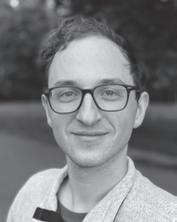
zachgatesmusic[at]gmail.com
As music education continues to evolve alongside the ever-changing landscape of the music industry, NJMEA will be offering a new ensemble that aims to create performance opportunities for students who are passionate for modern music. I’m grateful and excited to organize and share with you the very first year of the NJMEA Honors Modern Band. This ensemble will seek out and celebrate musicians from school programs across the state who have a passion for music, are talented in their instruments, and may not necessarily have a space to be musical in those capacities within traditional ensembles.
We are looking forward to accepting excellent guitar players, bass players, drummers, vocalists, keyboardists, and other instrumentalists who are looking for a rock-band environment.
This ensemble will perform at the NJMEA State Conference in Atlantic City and it’s going to be a great time. I highly encourage all who are attending the conference to come witness history: the debut performance of the NJMEA Honors Modern Band! The fantastic Dr. Bryan Powell from Montclair State University will be directing the ensemble this year. If you were there or at least heard about the modern band performance Dr. Powell’s students gave at last year’s conference, you know it was a wicked great time. You won’t want to miss this one!
The deadline for audition submission is coming up in November, so if you have a student you think would be a good fit for this ensemble, we would be more than happy to hear from them. For any further information on auditions, please check the NJMEA website, and feel free to email me for your emerging ensemble needs. I will admit, it’s a bit funny to call a rock band an “emerging ensemble”, given its decades-long history within popular culture. However, it has taken a bit for modern rock and electronic music to break into K-12 music education and I believe, like practicing a tough piece, great things just take time.
Jazz Education
Darrell Hendricks
dhendricks.njaje[at]gmail.com
The NJAJE (New Jersey Association of Jazz Educators) has begun to plan for the upcoming school year. We held our Summer Organizational meeting in July and are working together to provide new and exciting opportunities for students and membership for the 23-24 School Year. We are excited to announce that vibraphone has been added to the High School and Middle School ensemble instrumentation. The 2023 All State Jazz Ensemble and All State Jazz Choir will have performances in Atlantic City and Newark in addition to the annual NJAJE State Conference. Please feel free to join us for the performances and conference!!! Our conference theme this year is “Perspectives for Preparation and Performance” and will include several clinicians that have worked directly with the NJAJE State Jazz Ensemble Festivals in the past. This conference will be informative to both instrumental AND vocal ensembles and directors. We invite you to join us!! More information can be found on the NJAJE website. www.njaje.org
Lastly, please join me in thanking the NJAJE State Board for their dedication, time and commitment to help bring Jazz opportunities to students, teachers, and communities in New Jersey.

OCTOBER 2023 15 TEMPO
News From the Board of Directors

K-12 Ed Tech and Secondary General
Shawna Longo shawnalongo[at]gmail.com
The Music Tech Expo is evolving into the NJMEA Music Tech Festival!! This newly envisioned festival for everything music technology will take place during the NJMEA Conference on Thursday, February 22, 2024 at The Atlantic City Convention Center!
The Festival will be open to all New Jersey students grades 9-12 with accompanying music teacher (who must be a member of NJMEA/NAfME) and will run from 10:00am-5:00pm!!

Are you intrigued? Here are a few of the Festival perks:
• Lunch will be provided - thanks to our sponsors!
• Students and teachers will attend 5 masterclasses taught by master music tech teachers and music professionals from across the country! It will be an immersive, hands-on experience that is sure to inspire creativity!!
• Student Project Showcase/Performance during the Exhibit Hall Opening Reception!
• All submitted projects will be adjudicated ahead of time.
• We will be raffling off amazing tech products for attending students and teachers!!
• Did someone say DJ? A world-renowned DJ will be running a masterclass for students/teachers!!
Fees:
• Te acher(s) - regular conference rate (one day or full)
• Kids - $30 (includes attendance and 1 project submission)
• Additional $10 fee per extra project submitted
Masterclass Teachers:
• Gillian Desmarias from Maplewood, MN
• Dr. Barbara Freedman from Greenwich, CT
• Danielle Collins from Huntington Beach, CA
• Panel focusing on career paths in music technology
• DJ Hapa from Los Angeles, CA
Got questions or looking to register? Head over to our website: https://www.njmea.org/music-technology-expo
Or, feel free to email Shawna Longo, Technology/Secondary Education Chair for NJMEA - shawnalongo[at]gmail.com


TEMPO 16 OCTOBER 2023
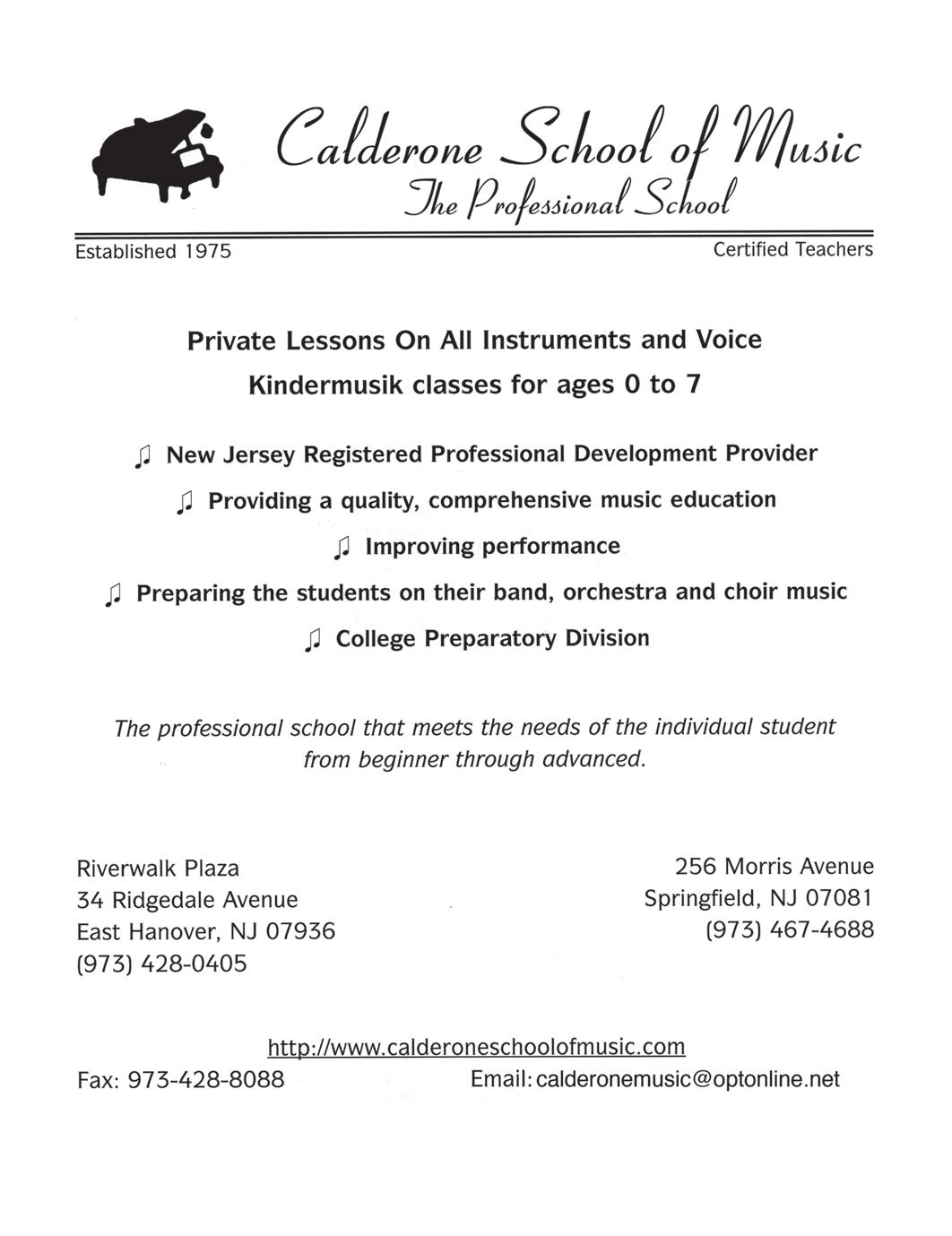
OCTOBER 2023 17 TEMPO TEMPO 54 JANUARY 2022 Riverwalk Plaza 34 Ridgedale Avenue East Hanover, NJ 07936 (973)428-0405 276 Morris Avenue Springfield, NJ 07081 (973)476-4888 Riverwalk Plaza 34 Ridgedale Avenue East Hanover, NJ 07936 (973) 428-0405 276 Morris Avenue Springfield, NJ 07081 (973) 476-4888
News From the Board of Directors

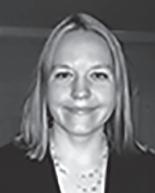

Orchestra Performance/Festivals
Susan Meuse susanmeuse[at]gmail.com
The All State Intermediate Orchestra had a wonderful concert on May 13 at Fernwood Middle School in Egg Harbor Township. Conductor Colin Oettle worked hard to prepare the students for an amazing program. Thank you to Kevin Maa for managing and Kate Wyatt for hosting the concert. The day was very successful thanks to the hard work of everyone involved. Congratulations to the students on a great performance!
On June 3, the All State Orchestra had their first rehearsal with conductor Adam Glaser. The students already sound great rehearsing this exciting program. Look for the program information in this issue of Tempo! The concerts will be on November 10 at Boardwalk Hall in Atlantic City and November 19 at NJPAC.
I am currently in the process of scheduling the NJMEA Orchestra Festivals. There will be festivals for both high school and middle school again. Please keep an eye on the NJMEA website for more information.


Retired Members/Mentorship
Kathleen Spadafino kspadeb[at]aol.com
Welcome to a new year of new possibilities! If you are relaxed and reading this article at home, then congratulations! You are retired! And you should definitely join us! NJRMEA is a sponsored group of NJMEA. We meet twice a year as General Membership meetings, once at the February conference and once again in May. The executive board meets additionally in October, December and March to plan future activities. We are a diverse group, with newly retired members as well as seasoned veteran educators – such as Paul Oster and Dorian Parreott. Our current president is Ron Dolce and I am the rep to the NJMEA board. In addition to observing and ultimately choosing the NJMEA Master Music Teacher each year, we are active as mentors and help with the IDEA and advocacy committees. We would love to hear from you – add your voice to our activities or offer some new ideas. We would like to plan more activities for our retired members and need suggestions for those. We have one planned tentatively for late October – watch for a TEMPO express about this! For more information or questions, please contact Ron at rdolce561[at]aol.com or me at kspadeb[at]aol. com. We look forward to hearing from you!
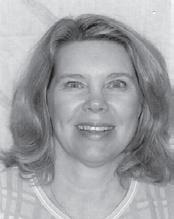
TEMPO 18 OCTOBER 2023
SELINSGROVE, PENNSYLVANIA SUSQU.EDU/MUSIC
BACHELOR OF MUSIC

Music

Education
Performance
Composition






BACHELOR OF ARTS IN MUSIC
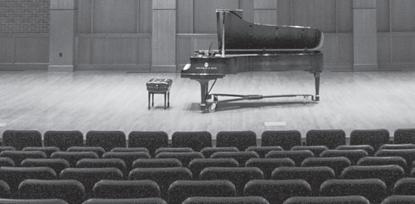
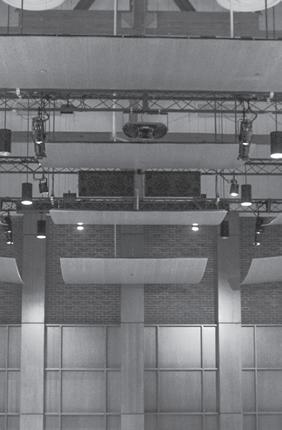

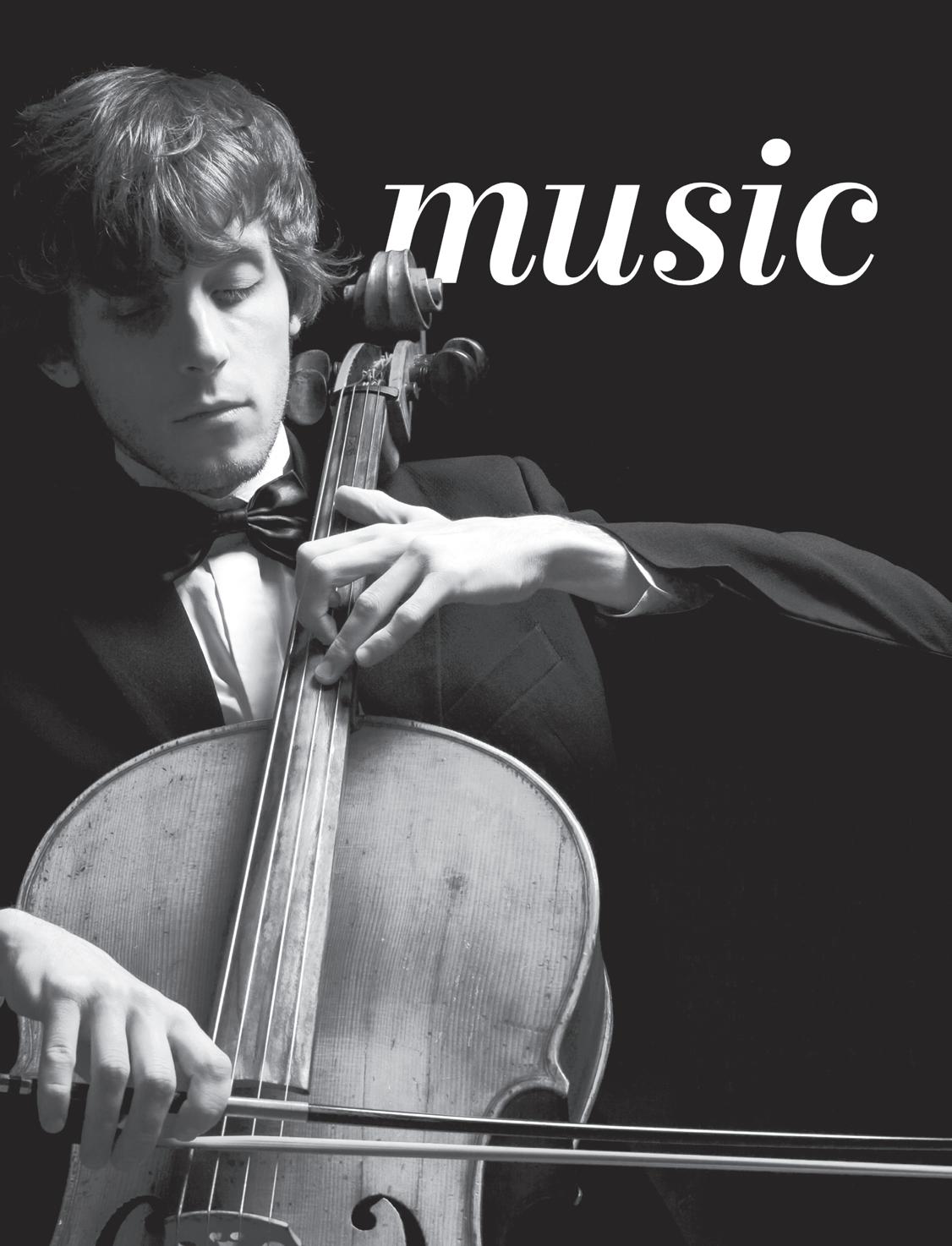
O ering convenient opportunities to


OCTOBER 2023 19 TEMPO
AT SUSQUEHANNA
The Crescendo Foundation is a Not For Profit Corporation initially formed by leadership of the New Jersey Music Educators Association, who serves as the registered agent. The Association’s mission includes the advancement of music instruction in New Jersey’s educational institutions at all levels that provide in-service and enrichment opportunities for music educators, as well as sponsoring various festivals and All-State performing groups for K-12 students. As a result, the Foundation’s goal is to provide financial support to underserved students and communities to create access to the aforementioned festivals and performing groups. In this first phase of giving, funds will go to a scholarship model geared towards students aspiring to participate in All-State ensembles.
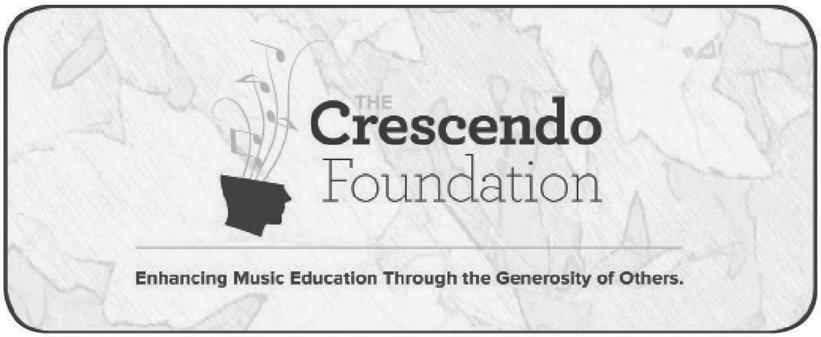
The Scholarship Framework
Through data assessment, it has been identified that All-State ensemble participation is not reflective of statewide total population demographics when comparing race and socio-economic status. The scholarship opportunities from the Crescendo Foundation gifts will allow students to apply for financial support to assist with any or all of the fees associated with participation including:
• Audition Fee - $25
• Participation Fee - $35
•Housing - $315
As part of the All-State experience and upon acceptance, students are housed together throughout the performance weekend. Scholarship opportunities would be available to cover the entire cost of this invaluable experience. In subsidizing these costs for qualified students and easing the burden of financial access, it is the hope of the Foundation that our All-State programming will become more inclusive, diverse and equitable.
We Need Your Help
We acknowledge that the Foundation’s ability to realize the plans outlined in the Scholarship program will require the generous support of the community. The initial phase of the program will require $50,000 which aims to assist 150 students over the course of the next three years in the areas of All-State Orchestra, Choir, Band and Jazz. All-State ensembles contribute to a total of 6 concerts annually in both Atlantic City and Newark. The vision for the Foundation is to eventually go beyond the scope of All-State ensembles to positively support several aspects of music education programming both at the State and Region levels, making this an important first step.
All gifts are tax deductible and there are many ways and opportunities to support this important effort. We thank you in advance for your support of our state’s students and providing transformative experiences outside of their school programs.
TEMPO 20 OCTOBER 2023
Giving Opportunities
Large Ensemble Concert Sponsorship - $5,000
•All State Orchestra and Mixed Chorus, Atlantic City
•All State Orchestra and Mixed Chorus, New Jersey Performing Arts Center, Newark
•All State Symphonic Band, Wind Ensemble and Treble Chorus, Atlantic City
•All State Symphonic Band, Wind Ensemble and Treble Chorus, NJPAC, Newark
Concert Sponsorship - $2,500
•All State Jazz, Atlantic City
•All State Jazz, New Jersey Performing Arts Center, Newark
Crescendo Giving Level - $1,000
Sforzando Giving Level - $500
Arts Advocate - $250
Friends of the Arts - $100
Other $_____________
All gifts and giving levels will be recognized in programs for that school year and program cycle, including concerts listed above, as well as NJMEA conference materials.
All gifts are tax deductible. Checks should be made payable and sent to:
The Crescendo Foundation

300 W Somerdale Road, Suite C
Voorhees, NJ 08043-2236
Please include contact information and appropriate name listing for program printing.
OCTOBER 2023 21 TEMPO
A New Name: Accessible Music Education
Maureen Butler NJMEA Accessible Music Education Chair maureenbutlermusic[at]gmail.com


NJMEA has been at the forefront of recognizing that music teachers need to be properly equipped to be able to teach children with disabilities. Several years ago our Board asked me to be the state resource person for this timely and important topic, and then soon afterwards decided to create a board position devoted to it. A quick look around the country shows that NJMEA is one of the few state music educators associations to recognize the importance of this subject in this way. Further, New Jersey is unique in that we have a state-wide committee that is a resource for music teachers who are looking for advice, strategies and techniques to include children with disabilities in their classes. Our state conference has included a growing list of workshops that address this topic, and it is heartening to see so many music teachers participating in the sessions each year.
At this time our NJMEA committee has decided to change our name from “Special Learners” to “Accessible Music Education.” The term “special learners” has been troublesome for various reasons since its inception. Although it may be perceived as gentler than many of the terms that historically came before it, the term can come across as patronizing and condescending. Many parents of disabled children as well as adults with disabilities have a negative view of references to “special needs.”
Our new name encompasses all the diverse learners that we teach and recognizes our goal to make music accessible to all of them.
The teaching world has changed dramatically from the days when children with disabilities were set apart from the general education population, in self-contained rooms or in specialized schools. Currently, many students with disabilities are included in regular education settings, a situation that requires music teachers to learn how to adapt and modify their lessons and activities so
that all children have an optimal chance at success. We may be seeing students with a wide variety of disabilities, including physical, developmental, psychological, neurodivergent, emotional, behavioral and multiple disabilities. Developing skills to make our lessons accessible to all of these students is integral to their success.
Our committee decided that “Accessible Music Education” best describes our mission - to help teachers develop the skills to provide all students with an enriching music education. Understanding how to use respectful language when referring to those with disabilities is an important step in accomplishing this.
Respectful Language
As a society, we are constantly evolving in our attitudes about and approaches to many issues, and disability awareness is one of them. Thanks in large part to the American with Disabilities Act, we have become more aware of the rights and abilities of those with disabilities, and society is working to ensure equal access across all aspects of life.
Just as societal trends change, language is constantly evolving as well, to better reflect our thoughts and attitudes. Many terms that were in vogue a century ago are downright offensive. Even those that have come into practice more recently can be considered condescending. Consider the term “hearing-impaired.” Certainly less offensive than its historical predecessors, it still reflects an attitude that suggests that deafness is something that is “broken” - and for many members of the Deaf community, who take pride in their language, their community and their deafness, it is an insult.
Another important distinction is whether to use people-first language or disability-first language. When we refer to someone’s disability first, the focus seems to be on the disability as their defining characteristic. When
TEMPO 22 OCTOBER 2023
we refer to the person first, we focus on someone who has many attributes, including a disability. In general, it’s more respectful to speak about the “boy with paraplegia” as opposed to “the paraplegic.” However, note that some groups and/or individuals prefer the reverse. For members of the Deaf community, the term “Deaf,” rather than being seen as a disability, is a source of pride. Similarly, there are individuals within the autism community who feel that autism is an integral part of who they are, and prefer to be identified as “an autistic person.” Moreover, some people feel positively about being identified as a “disabled person.”
Some of this may seem confusing as we see in a new light the terms that we may have become comfortable with. If you’re in doubt about how to refer to your students or their families, find out what their preferences are. Ask the students, their families, or knowledgeable coworkers. Consider carefully, too, how our own attitudes are conveyed to our colleagues and students. How do we speak in our classroom in front of students? What do we
say in the faculty lounge to reinforce positive attitudes regarding children with disabilities?
As teachers, we have the unique privilege of being able to shape children’s viewpoints about themselves and about others. In our classrooms, we can use our words to promote understanding, empathy, and respect in typically-developing students, and self-confidence and selfesteem in our students with disabilities. Let’s continue to strive to change children’s lives through music, through Accessible Music Education.
Resources
“It's Time to Change How We Talk about Disability in Education” https://www.berklee.edu/berklee-now/ news/it-s-time-to-change-how-we-talk-about-disabilityin-education.
Demystifying Disability: What to Know, What to Say, and How to be an Ally by Emily Ladau, Ten Speed Press, 2021.
OCTOBER 2023 23 TEMPO
2024 NJMEA State Conference Altantic City Convention Center Atlantic City, NJ February 22-24 Register Online https://www.eventsquid.com/event/21313 Conference Justification Toolkit available on the NJMEA website under the Conferences tab.
Tech Tips for Elementary General Music Class
Amy M. Burns Far Hills Country School

aburns[at]fhcds.org
Throughout the summer, I attended multiple elementary general music virtual conferences and came away with many new ideas and tips. I am always looking for new tech tips to save me some time, to reach multiple modalities of learning styles in my class, and to level up my classroom. Here are some that you might know or might be brand new that you can try immediately.
Tech Tip #1 Guitar Chord Tools Extension

(https://workspace.google.com/marketplace/app/guitar_ chord_tools/252705699803)
Purpose: Change the key to a song on a Google doc with one click
When I attended the Elementary Music Summit by Bryson Tarbet of “That Music Teacher Community”, I adored listening to Theresa Hoover’s session about Google Tips. She showed us the Guitar Chord Tools Extension. First, you copy and paste a lyric sheet with guitar or ukulele chords from a popular site, into a Google doc. You then go to Extensions>Guitar Chord Tools>Show Controls. From the Control Panel, you can change the key. Click go and the chords listed above the lyrics now change to the new key (See figures 1, 2, and 3).
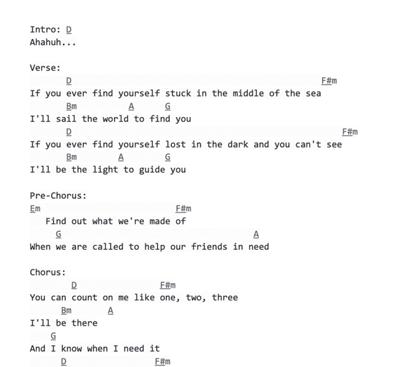
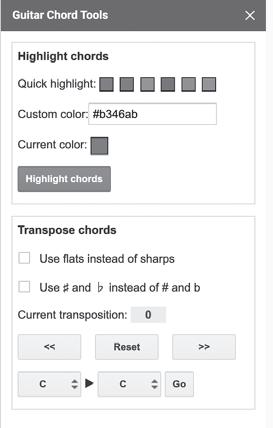

TEMPO 24 OCTOBER 2023
Figure 1: Count on Me by Bruno Mars copy and pasted into a Google doc.
Figure 2: Go to Extensions>Guitar Chord Tools>Show Controls and change the key.
Figure 3: I changed the key from C to D. When I clicked "Go", the chords changed in the doc.
Tech Tip #2 Create Interactive Rhythm Dice

(https://4four.io/rhythm/dice)
Purpose: Use for rhythm games or assessment purposes
Katie Argyle of Midnight Music Community (https://midnightmusic.com/) showed this website, https://4four.io/ rhythm/dice, where you can choose a variety of rhythm values to display on one to four dice. Once you select the six rhythm values per die, you click OK. Click “Roll” and the dice will roll when you tap them on the screen or on your device’s trackpad/mouse. You can also create a link to your dice for the students to access on their own devices.
Tech Tip #4: Canva’s Presentation Tools
(https://www.canva.com/education/)
Purpose: Level up your lessons and manipulatives with these tools
My friend and NJ music educator, Jenn Jenkins, showed me a site on Instagram called “Teacherslovehacks” where they went through these presentation tools that can be accessed from your device’s keyboard. These tools can level up your lessons or manipulatives.
• b – blur: You can blur the entire screen when you need the students to change their focal point from the screen to you.
• o – bubbles: This could be used as a motivational tool for your youngest of learners. When you tap “o”, the screen fills up with bubbles and makes bubble sounds until they all pop.
• c – confetti: When your students do a great job, click “c”, and set off the confetti on the screen.
• q – quiet: We all know that there is a point in every school year when your students will no longer listen to you. However, tap the “q” key and the emoji pops up and says “shhh”. Often, they will listen to the emoji.
Though logging in is not necessary to use this site, if you do create a free account and login, you can access rhythm trainers, tools like mini drum machines, instruments like guitars and barred instruments, bingo, groove soup, and more. Plus, you can track your progress when using these assessment tools.
Tech Tip #3: Emoji Generator

(https://byrdseed.com/emoji2/)
Purpose: Singing and writing prompts
Years ago, I took Dr. Feierabend’s First Steps Certification with the amazing Dr. Missy Strong. She introduced me to this very hidden website: https://byrdseed.com/emoji2/ This site has simple emojis that the students can click on to create an arioso. An arioso is an improvised, made-up song that students create on the spot. When they click on this, it helps them sing a song by generating prompts. My young students love this site to create a song. Students can also use this as writing prompts for lyrics.
• u – curtain: Tap the “u” key and the curtain will close. Tap it again, and the curtain will open with applause. This could be another motivational tool for your classroom.
• d – drum roll: Tap “d” for a drum roll. Use this as the students enter the classroom.
• Numbers – The numbers will give you a timer. The numbers coordinate to the minutes with 0 giving you three seconds. You can set it up to have music as well.
• m – mic drop: I advise my students to never drop a real microphone as they are expensive. Therefore, use this to give them a safer alternative or choose to not show this one so you do not give them any ideas.
Did you know that as a K-12 educator, you can receive a free version of Canva that emulates the pro version? Click here to register: https://www.canva.com/education/
Tech Tip #5: AI Tools
Purpose: Numerous ways to assist a music educator
For this past year, we have heard a lot about artificial intelligence (AI) tools in the classroom. We have heard many pros and cons. However, there are some great pros that can assist elementary general music teachers. Here are a few:
• Examples for wording emails, letters of reference, and more.
OCTOBER 2023 25 TEMPO
Figure 4: 4four.io/rhythm/dice
Figues 5: Emoji prompts
• Lesson Plan ideas and entire lesson plans
• Curriculum integration ideas.
• Learning Objectives for each grade level.
• Progress reports, especially for challenging reports.
• Create lists for various activities.
• Help with creating presentations for concerts, parent events, and more.
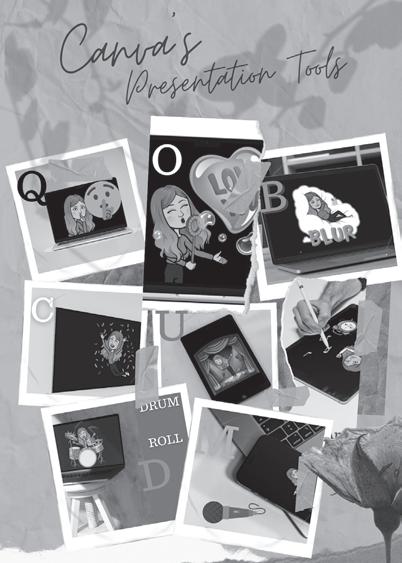
• Assist with writing articles for advocating the music program in your school.
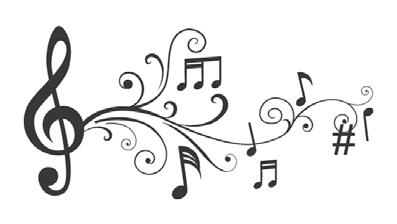
Two popular AI tools are ChatGPT and Bard.
• ChatGPT (https://chat.openai.com): Powered by OpenAI, ChatGPT is an advanced conversational AI tool that uses deep learning models to generate human-like responses. It can be integrated into various applications, enabling natural and interactive conversations with users.
• Bard (https://bard.google.com): Bard is Google's experimental, conversational, AI chat service. It is meant to function similarly to ChatGPT, with the biggest difference being that Google's service will pull its information from the web. Like most AI chatbots, Bard can code, answer math problems, and help with your writing needs. However, many tools you already use might have AI built in. A few examples are Snapchat, Canva, and Vocal Remover (https://vocalremover.org/). If your students are using Snapchat (or you as well), then they probably have texted back and forth with the AI Bot built into the program. Canva has AI built into the program as well, so you can perform some of the following applications.
Canva’s AI Tools:
• Magic Presentation: Type five words about a presentation and Canva will create a presentation for you to use or adapt. Try this with music advocacy and see the results.
• Magic Design: Magic Design will create a poster from an image you upload. For example, if you perform on the flute at events, you could upload a picture of yourself, choose the style and headline, and Canva will create a variety of posters for you.
• Magic Edit and Erase:
• Magic Edit lets you replace the item you erased with another item. For example, you can erase the daisies in a picture and replace them with roses. When you do this, Canva gives you many options of roses so that you do not have to go with just one choice.
• Magic Eraser lets you erase an item from a picture you uploaded or one you found in Canva.
• Edit with Beat Sync: This one is interesting because I compare it to Magic Movie in the iOS app where you can add videos or photos, then bring in the music, and it will sync up the music so that the pictures and videos change on beat. You do have to do this by creating a video in Canva as opposed to a slide show so that the music will play across the slides. I also tried to make a “follow the bouncy ball” video but it looks as if it syncs to macro or larger beats as opposed to the micro or subdivided beats.
• Translate: The Translate tool will convert your text on the screen to over 100 languages without having to leave Canva.
• Text to Image: Describe an image you want, and Canva’s AI will create it for you.
Vocal Remover
Vocal Remover is a free AI site that will remove the vocals from songs that you upload. You can then export the new file so you can use it for classroom purposes. It can also split music into separated parts, change the pitch and tempo of the song, and analyze a song to find the key, scale, and bpm. Vocal Remover is a fantastic tool, but it is also free so it is limited in the number of times it will work well. Another option is Moises (https://moises.ai/).
I hope that these tech tips help you throughout this school year!
TEMPO 26 OCTOBER 2023
Figure 6: Canva's presentation tools

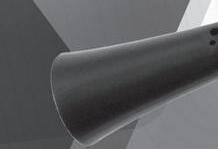














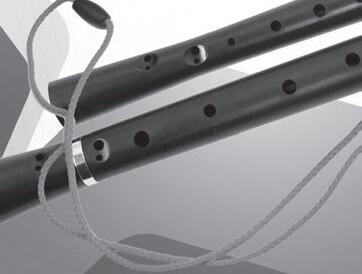
























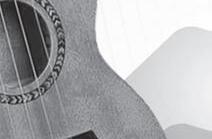











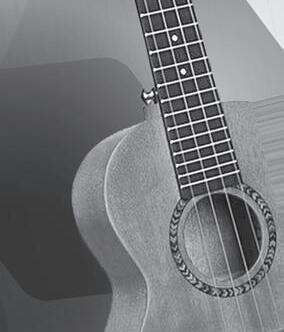

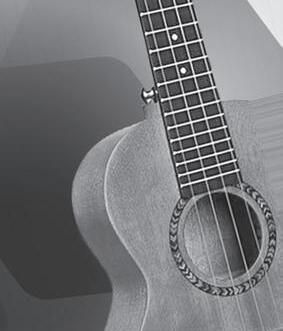
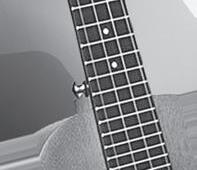

■ Peripole®Halo® Hanger Neck Strap • Holds recorder in true vertical ready-to-play position. • Won’t slide up and interfere with thumb position or windway. • Includes Safety-Snap® breakaway unit. ■ Extra-Widezippered case designed to hold recorder with Halo® neck strap attached. ■ Stick-On Velcro Thumb Spot to help position the right thumb. ■ Online access to Chart with printing/photocopy permission at peripole.com. ■ Cork grease and cleaning rod included. Enrichment Kit Contents: Peripole® Halo® Recorders and Halo® Hangers are Protected by Trademark and Trade Dress Peripole® Fingering ABS construction. Looks and feels like a • Includes Enrichment Kit. The O cial Recorder of the Carnegie Hall Link-Up* Program. Still The Best Classroom Recorder Made! • Smooth, even tone with accurate tuning and intonation! Superior Sound! • Complete Enrichment Kit Included! • New Lower Price! P6000 SOPRANO, BAROQUE FINGERING P6001 SOPRANO, GERMAN FINGERING P6250 ALTO, BAROQUE FINGERING P62501 ALTO, GERMAN FINGERING ▼ ALTO P6250 SOPRANO P6000, P6001 PERIPOLE.COM 800.443.3592 ® Peripole® Halo® Gold Recorder Contact us about teacher pricing and discounts on classroom sets. 800.443.3592 PERIPOLE.COM A New Classic From PARTNERS IN MUSIC EDUCATION UKULELE FEATURES: • Great Action, Intonation, and Tuning Retention! • No Sharp frets at sides of neck • Closed geared tuners to keep out dust • Factory installed strap buttons on all instruments • Beautiful sound! • Includes Enrichment Kit! • Mahogany wood ENRICHMENT KIT FREE WITH EACH INSTRUMENT: • Padded gig bag with zipper pocket to hold accessories • Strap • Vibrational digital-chromatic tuner • Capo • Extra set of strings • Polishing cloth • Finger shaker for strumming hand Great Quality · Great Price · Complete Kit BY ENYA lassic eripole® UKULELE
Beyond the Conference:
Following up on Questions from the NJMEA 2023 Conference on Achieving and Maintaining Flow State in the Classroom
Drew X Coles and Megan Reilly
dxc2102[at]tc.columbia.edu
mr4222[at]tc.columbia.edu
At the 2023 New Jersey music educators Association conference, we presented research that we conducted on Flow State, or a state of optimal experience, as observed in in-service music educators. This work built on research and writings from Mihaly Csikszentmihalyi (2014) and Lori Custodero (2004). As a part of the aforementioned research, semi-structured interviews were conducted with participating music educators. The interview participants were all New Jersey music educators teaching in various content areas. The presentation was attended by both in-service and pre-service music educators who posed questions not only about our research, but about applications in and to the field. After reviewing notes from the session, we amalgamated the audience questions with similar themes that focused on parallel lines of inquiry. Here are three points that we would like to respond to in the hopes of furthering this conversation with the broader music education community. The pursuit of flow in music education is an endeavor worthy of our attention and dedication. As we continue to seek answers to these inquiries and explore new questions, we move closer to unlocking the full potential of music as a medium for human expression, growth, and fulfillment.
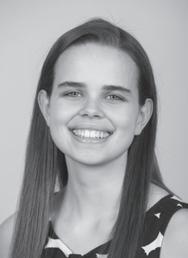

in which a pedagogical aim that would be missed because one component of a lesson goes longer than expected could be combined with another prescribed goal and applied in the classroom in a future lesson or session. This isn't always the case. Regardless of if a mist item is reapproached, or disregarded, the magnitude and context of the missed item(s) should be delicately considered by the facilitator.
This much like the questions that follow, is a very complicated one, and thus the answer is complex. Whether or not something that's missed is important comes down to exactly what was missed, and the overarching impact of missing that thing. If missing something means endangering our students, costing our institutions or communities significant losses in valuable assets, or invalidation or othering of those that we serve, then perhaps that level immersion is too costly. However, there is certainly a middle ground in which small elements of our prescribed plans could stand to be overlooked in service of the greater good of a deep level of immersion that serves all participants in the classroom. This is especially true in situations

To best understand this question we need to get to the root of what is meant by a false sense of being in a flow state and how that impacts stakeholders. For the purposes of this question, we will look at what we call untethered flow experiences. Since being in a state of flow is experienced individually, it is logical that any two individuals experiencing the same phenomenon would have a different relationship with, and thus experience of, flow. Therefore, it is possible in a facilitated learning environment for a teacher to be experiencing a state of flow and for a student not to be experiencing a flow state, or at least not to the same degree as the teacher. Especially in high-ratio class environments, this is an inevitable reality – not all students in the class are going to have the same level of engagement as one another, nor will the level of engagement of every student in the class align with that of the teacher. However, if we consider the aggregate level of engagement of the students as an indication of a shared experience of flow, then we can answer this question in relation to what we might call tethered flow experiences, or what Kang (2022) would refer to as group flow. Kang (2022) recommends the concept of group flow as a helpful practice in teacher education. The concept of Group Flow may encourage preservice and inservice music teachers to take a more student-centered approach and to effectively share goals with students (Kang, 2022).

Through this lens, achieving flow is not solely dependent on the teacher's perspective; it also involves the engagement and


TEMPO 28 OCTOBER 2023
experience of the students. It is possible for a music teacher to feel like they are in a state of flow while teaching, perhaps due to their own enthusiasm for the subject or a strong connection with the material. However, this does not guarantee that the students are also experiencing flow or even being fully engaged in the learning process. While a teacher's flow state can positively impact the classroom atmosphere and enhance the learning experience, it is essential to assess whether the students are benefiting from the lesson as well. If the students are not engaged or are not experiencing a sense of flow, it may indicate a mismatch between the teaching style and the students' needs or interests.

Similarly to the musical example, The working lives of teachers involve many different versions or renditions of their work to be expressed in distinctly different formats each day. In essence, it could be said that no two days are the same in the world of teaching. However, the teachers must have school conditions that allow them to focus their energy on teaching and learning (Beard & Hoy, 2010). Additionally, the balance of resources available to music teachers is also significant – “resources in excess of demands may yield increased boredom, and demands in excess of resources may yield increased distress” (Bakker, 2005, p. 38).
Ultimately, achieving flow as a teacher can be a valuable experience, as it often leads to increased creativity, productivity, and job satisfaction. However, it is equally important to consider the students' engagement and learning outcomes. If the students are not genuinely engaged or benefiting from the lesson, the teacher may need to reassess their approach and find ways to create a more meaningful and impactful learning experience for their students. Flexibility and a willingness to adapt teaching methods can help strike a balance between the teacher's flow state and the students' engagement in the learning process.
Staying in a flow state as a music teacher can be challenging, especially when faced with constant shifts in the daily routine, environment, and other distractions. However, with some mindful strategies and adaptations, it is possible to maintain focus and productivity. We would encourage teachers to look at the larger cycle of their work in the same way that performers would be urged by a conductor or coach to look at larger phrases of musical compositions when performing. We’ll use this piano reduction of the Marriage of Figaro by Mozart to Illustrate our point. Individually, each of the measures presents its own instead of challenges rooted in melodic contour, chromaticism, and depending on the instrument, issues of articulation or range. However, in striving for the most musical rendition of this passage, a performer may want to focus on an expression of the phrase depicted in figure 1 as two roughly equal segments with a quarter rest dividing them. Alternatively, a performer might decide to focus on the entire six-measure passage as a single more substantial phrase.
The journey to understanding flow states in music education is an ongoing one, requiring collaboration among researchers, educators, and practitioners. We're grateful to have had the privilege to have had an in-depth discussion with other music teachers and music teacher educators as well as pre-service teachers at the NJMEA conference. By aggregating the findings from empirical studies, qualitative investigations, and anecdotal experiences, we can paint a comprehensive picture of how to harness the power of flow to create transformative musical experiences for learners of all ages and levels. Embracing the concept of flow within the music education community can lead to a harmonious symphony of learning, creativity, and selfdiscovery, enriching the lives of both students and educators along the way.
References
Bakker, A. B. (2005). Flow among music teachers and their students: The crossover of peak experiences. Journal of Vocational Behavior, 66(1), 26–44.
Beard, K. S., & Hoy, W. K. (2010). The nature, meaning, and measure of teacher flow in elementary schools: A test of rival hypotheses. Educational Administration Quarterly, 46(3), 426-458.
Csikszentmihalyi, M. (2014). Applications of flow in human development and education: The collected works of Mihaly Csikszentmihalyi. Dordrecht: Springer.
Custodero, L. A. (2002). Seeking challenge, finding skill: Flow experience and music education. Arts Education Policy Review, 103(3), 3-9.
Kang, S. (2022). An exploratory study of music teachers’ flow experiences between performing and teaching music. Journal of Research in Music Education, 1.

OCTOBER 2023 29 TEMPO
Music Down the Hall: The Positive Impact of the Arts
 Dr. Larisa Skinner Passaic Gifted and Talented Academy lskinner[at]passaicschools.org
Dr. Larisa Skinner Passaic Gifted and Talented Academy lskinner[at]passaicschools.org
As a music educator, I’ve often advocated for my own programs with the understanding that music benefits the whole student. I’ve experienced firsthand how students develop socially, emotionally, and academically because of their involvement in my program. Involvement in music helps to develop discipline, self-esteem, community building, communication skills, and grit, to name a few. From a general perspective, most people would probably agree with these benefits.
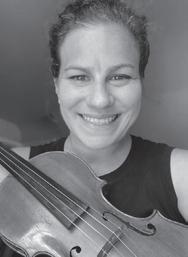
But as we (teachers) go through the daily grind of the school day, these long-term benefits may be swept under the rug as we are bogged down by curricular deadlines, student management strategies, administrative tasks, and achievement scores. Music teachers may find it hard to schedule adequate time to see their music students, and general teachers may be reluctant to let their students miss class for music. Even though we know it’s good, even though we know we want it for our students, sometimes priorities shift. At each developmental stage of a young student, participation in performing arts can have a significant impact.
Prioritizing the Arts
I am fortunate to be part of a school community that has a high appreciation for and support of the fine and performing arts. My school, the Passaic Gifted and Talented Academy (PGTA), is part of the Passaic Public Schools system in Passaic, NJ. According to our district report card, the city of Passaic is 92.5% economically disadvantaged and 30.5% of students are English language learners. Our school accepts students through an application process and offers a unique approach to student offerings and opportunities for elementary and middle school students. The school provides intensive study in the areas of performing arts (band, choir, theater, and strings), visual arts (2D, 3D, digital, and media art), and physical education (sports, coaching, and health), in addition to their general studies.
In a recent conversation with my principal, John Mellody, we discussed how PGTA’s approach to prioritizing the arts in scheduling benefits our students. Upper elementary and middle school students receive six periods a week of their “strand” or major area of study. For example, a student would be scheduled for my string orchestra class three days a week for a dou-
ble period. This equals to 240 minutes a week of music study, all happening during the school day. I asked my principal if this amount of time negatively impacts their other studies. His response was, “No, actually quite the opposite!” Our school is the highest performing elementary and middle school in the district. Mellody attributes the arts as an integral part of our achievement in rising to the top.
Benefits of the Arts in General Education
My curiosity has led me to consider how my general education colleagues experience the benefits of music education in their own classrooms. I asked them two questions: What role does music education play in our school community?, and How is music education beneficial for our students? The ultimate goal was to better understand from an outside perspective what role music education plays in student development academically, socially, and emotionally.
As teachers reflected on these questions, a major theme emerged. All the teachers interviewed expressed that access to music education positively impacts other aspects of a student’s learning experience. As students are introduced to and incorporated into the school music program, their involvement produces an immense inner and outer sense of pride and accomplishment. Successful experiences in music class provide students the confidence needed to tackle challenges presented in their other classes. Teachers identified a definite connection between music and students’ improvement in their academic and social-emotional skills.
Great Beginnings
At PGTA, the second and third graders have the opportunity to participate in music classes once or twice a week, equaling 40 to 80 minutes of musical instruction. In their music classes they learn singing techniques, ukulele, recorder, music theory, and violin. Founda-
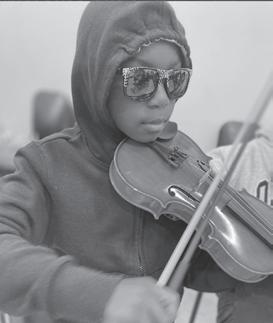
TEMPO 30 OCTOBER 2023
tional to the school’s vision of providing rigorous instruction in core academic subjects as well as the arts, the second and third graders gain musical exposure that is foundational to their growth as students and musicians.
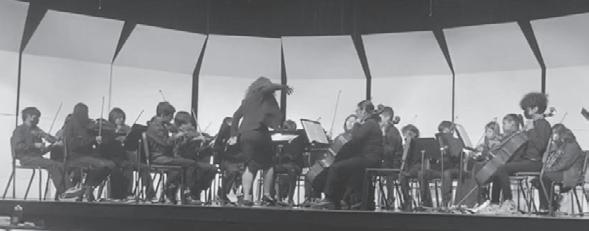
What do the teachers of our younger students see as the benefits of musical instruction? Prudence Price, a veteran teacher of Passaic Public Schools, is very committed to the arts personally and professionally. Having participated in music during her childhood and in college herself, and now with her daughter pursuing vocal jazz performance, Price understands what kind of impact music education can have on students as they navigate through their educational journey.
Price witnesses the benefits of music instruction every day. As she reflected on music’s impact on her students, she explained that music “acts as a catalyst for motivation that encourages the students to think abstractly as well as creatively.” Her students look forward to violin class every Thursday and Friday. “Socially, music education provides opportunities for students to meet, work, and play alongside peers that have the same interests,” Price explained. She also described how music gives her students an opportunity to experience success, especially if they struggle academically.
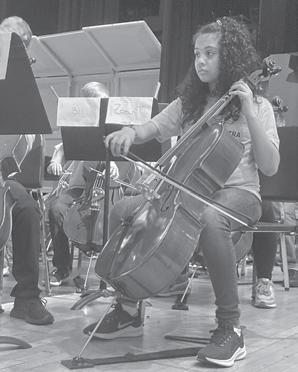
Fostering Growth
In fourth grade, PGTA students get the opportunity to select their strands, choosing from different disciplines within the performing and visual arts. Because of the early exposure my string students have to the violin in second and third grade, many of my fourth grade students already have two years of musical experience under their belt when they join the band, choir, or strings class. For the next four years, students will dedicate themselves to focusing on their musicianship and artistry in their specific field of study.
Jen McGlynn, another veteran teacher in the Passaic community, fully supports students as they participate in the arts. A language arts educator by day and painter by night, McGlynn emphasizes the importance of artistic and self expression as she described the impact the arts has had on her students. “Students are so proud to be part of the band, strings or chorus.” Pride in one’s work is an invaluable gift to a child who may struggle in other academic areas. The confidence they receive from their music class fuels them to tackle other challenges in school and life. McGlynn, who services many of the English Language Learners (ELL) and students who may be academically behind grade level, described how par-
ticipation in the arts is a vital part of their life and their success. McGlynn states that possibly because of student participation in performing arts, “I see an improvement in students academically as they progress in the school year in fourth grade.”
Direction for the Middle Years
Sixth through eighth graders at PGTA continue to hone their craft they selected in fourth grade. Middle school is a tumultuous and tremendous time of growth and maturity. Much is expected in the areas of responsibility, academics, and independence. As sixth graders are given the opportunity to demonstrate that they can handle more challenging tasks, performing arts students at PGTA rise to the challenge. They explore their discipline with even greater vigor and are expected to perform with higher musicianship and more performing opportunities outside the school community.
Marina Vogiatzis, a sixth grade math teacher at PGTA, has noticed the impact of the performing arts on her students: “Every day I see students come to my class with a sense of accomplishment after a successful practice.” Likewise, Daniel Hennessy, sixth grade social studies teacher, describes how “the ability to act, dance, sing, and perform music gives students a strong set of skills they can bring into the classroom.” All of the teachers who I interviewed agreed that participation in the arts is beneficial to student learning, emotional health, and academic performance. Liliorara Helgiu, an 8th grade math teacher and avid supporter of the arts, agrees: “It shows students that hard work is possible and that it pays off.” Participation in our school’s performing arts programs provides numerous opportunities for team building, positive attention, and discipline during the crazy middle school years.
A Challenge to Walk Down the Hall
Each school is one-of-a-kind - no school community can be replicated. We all service a unique blend of students who are trying to navigate through a complicated and challenging journey called childhood! As a member of the PGTA community, I am honored to partner with students as they learn how to play an instrument and to work alongside colleagues who understand just how important music can be in a child’s life. Kathryn Ahern, 6th grade language arts teacher and newer member of PGTA, saw right away that the performing arts and academics were an integral part of our school. “The music program here
OCTOBER 2023 31 TEMPO
truly helps bring our school, students, and staff together.”
If the arts are not already foundational to your school’s community, I challenge you to explore what may happen if you encourage (and maybe remind) teachers to allow students to attend their lessons, personally volunteer at a concert, and intentionally seek out performing opportunities that showcase student work for the school community. Create a culture of music at your school by networking and sharing stories every time you see your colleagues. Share about your program on so-
cial media so faculty can see and celebrate with you and your student musicians (you don’t have to include names or pictures to give updates)! Evelyn, an 8th grade cellist, described in an essay about the importance of music in her life. “It opened up a world I never imagined…[my music teacher] has shown me a musical path I never knew existed.” Some teachers just need an invitation to walk down the hall to the music room. It may make all the difference!
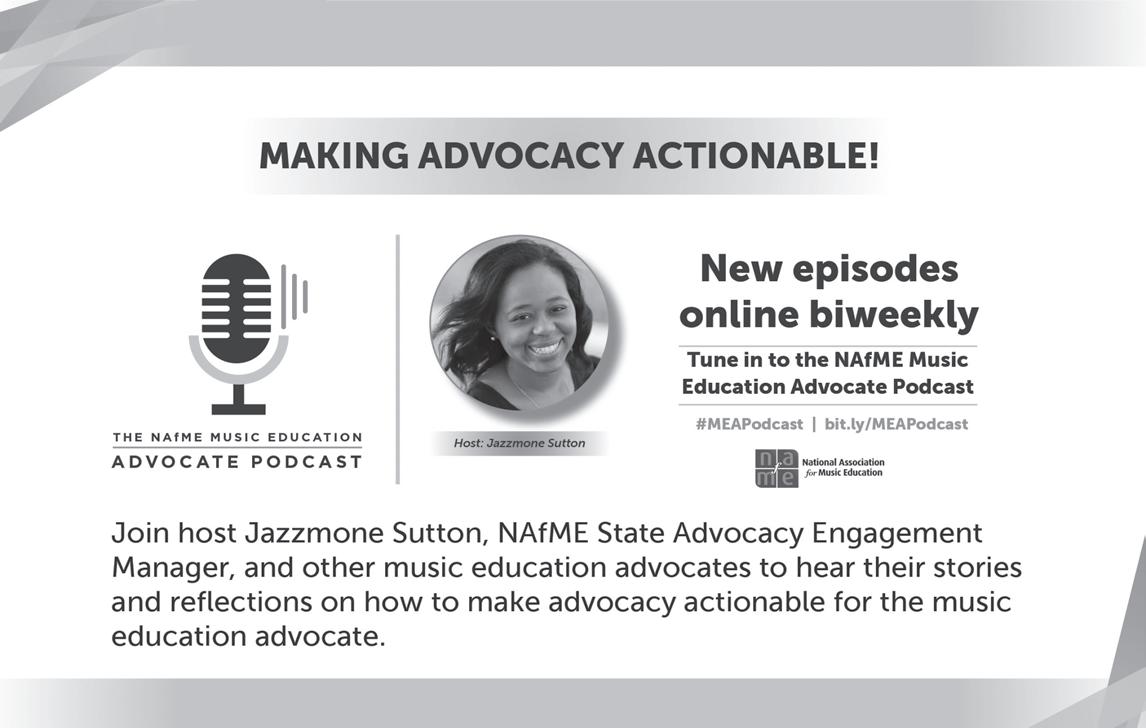
TEMPO 32 OCTOBER 2023
Bachelor of Arts in Music



Double Major with Music
Bachelor of Music Education

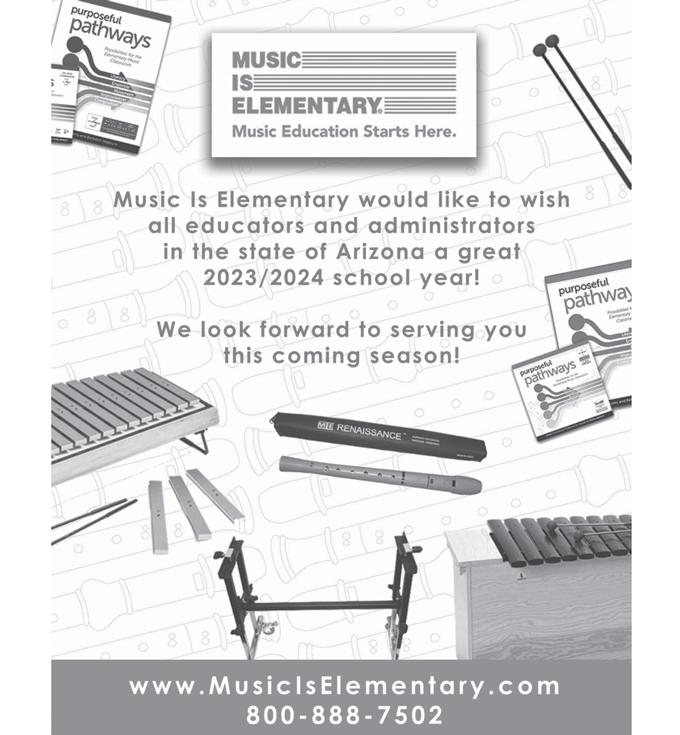
Bachelor of Music in Performance



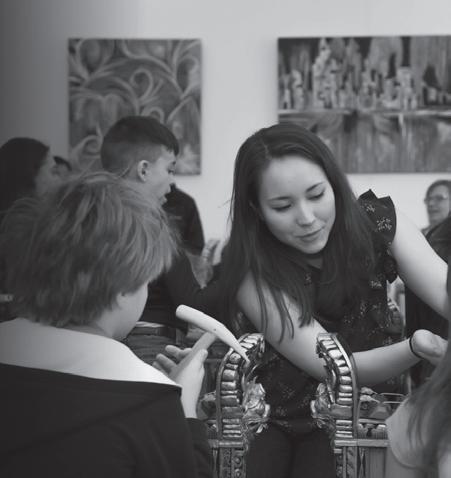
For Open House and Audition dates, go to: www.gettysburg.edu/music
Sunderman Conservatory of Music Gettysburg College, Gettysburg, PA 17325 tel: 717-337-6815 • www.gettysburg.edu/music
OCTOBER 2023 33 TEMPO
FIND YOUR MUSIC
"Ain't-a That Good News":
Lessons from Uzee Brown's Solo Voice Concert Spirituals
Jameon D. Moss Teacher's College, Columbia University
jdm2252[at]tc.columbia.edu
With musical roots firmly planted in African American folk traditions (Brown, 2001; Brown, 2020), Uzee Brown’s solo voice setting of “Ain’t-a That Good News!” (from his spiritual set O Redeemed!) makes an excellent piece with which to begin exploring the spiritual performance practice and style, particularly for high school students studying advanced classical voice (Brown, 1994). As American choral conductor Andre Thomas (2009) put it in a lecture at Hampton University, “There is no arranger living that has published more solo voice settings of the spiritual than Uzee Brown.” Brown’s compositional style—especially his use of chromaticism and blending of more contemporary Black genres with Western classical music (e.g., arias and art songs)—has influenced younger composers like Brandon Waddles and Carlos Simon (Holley, 2020). His extensive collection of solo voice concert spirituals and penchant for fusion, while still maintaining the characteristics of the original folk aesthetic (Brown, 1994, 2002), makes him an ideal arranger for anyone seeking to learn the performance practice of the solo voice concert spiritual.
Brown’s arrangements are particularly well suited for advanced applied voice students (due to range and tessitura issues) who require an English or sacred piece for performances or auditions (including collegiate auditions). To that end, this article will briefly describe the solo voice concert spiritual and Brown’s background. Additionally, it offers four practical performance and style applications for instructors, related to vowel quality, dialect, legato, and improvisation.

What Are Solo Voice Concert Spirituals?
The spiritual, which marries idiomatic West African and Western European music, is the foundation of such quintessentially American genres as blues, jazz, gospel, and rock and roll (Jones, 2019). A sacred gem of Black America, the early spiritual was a vehicle for religious, social, and coded expression (Brown, 2022). However, it was not until slaves’ forced conversion to Christianity that the spiritual as we know it was born (Brown, 2011). Brown (2011) explain, “By adapting to a religion which was forced upon them as a means of civilizing
and pacifying, slaves found all the resources for expressing social and political activism while simultaneously fulfilling a spiritual and psychological need” (p. 3).
While there are records describing their performance as far back as the early 1800s (Jones, 2019), it was not until after the Civil War that the term spirituals was coined to define “a [Black American] sacred song born of the individual spirit” (Brown, 2022, p. 3). Although “born of the individual spirit,” most spirituals were not solo songs, but congregational pieces incorporating every parishioner who wished to contribute (Brown, 2011). Today, in the Western, concertized solo context, spirituals are arranged by composers steeped in both the traditions of the Black music experience and music of the Western canon, such as art songs and arias (Jones, 2019). Concert spiritual arrangements marry the musical genius of enslaved creators to the sensibilities and aesthetics of the classical vocal concert stage (e.g., vowel quality, legato, diction, virtuosic vocal lines) (Brown, 2022). This makes them ideally suited for classical voice students in the applied studio.
Composer Uzee Brown
Uzee Brown sums up his formative years by saying, “I knew Mahalia [a famous gospel singer] before I knew Mozart” (U. Brown, personal communication, January 20, 2023). Brown takes the spiritual from its communal form and fashions accompaniments using more complex African American music genres—particularly ragtime, stride piano, and gospel. He then fuses that with the aesthetic of Western European classical vocalisms, marked by virtuosic singing (Brown, 2002; Jones, 2019). Born in 1950 and shaped by the civil rights movement, Brown’s writing style continues the tradition of famed early 20th-century spiritual arranger and composer Hall Johnson, whom Brown describes as a “major influence,” with the heavy use of dialect and chromatic harmonies (U. Brown, personal communication, January 20, 2023). Additionally, he expands on Johnson’s foundation by incorporating implied vocal gospel stylings and more intricate Black music genres in the accompaniments; for instance, big band jazz elements (e.g., swing).
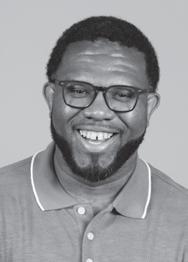
TEMPO 34 OCTOBER 2023
Performance Practice
Brown’s “Ain’t-a That Good News!” “comes closest to the jubilee, in its joyful, energetic rhythms, and its confident proclamations of present and future victories over the woes of mortal life” (Brown, 1992, p. 26). This solo voice concert spiritual is easily transferable to the standard classical repertoire (e.g., opera/oratorio arias and art songs), as the Western classical concepts of legato—moving fluidly from vowel to vowel (Smith & Chipman, 2007)—and vowel quality are necessary skills for performing it (U. Brown, personal communication, January 20, 2023). Furthermore, “Ain’t-a That Good News!” (and other solo voice concert spirituals like it) builds on an understanding of these classical aesthetics and techniques as it blends them with traditional spiritual performance style and practices, such as improvisation and dialect.
Vowel Quality and Dialect
Pure, concise vowel sounds are classical hallmarks (Smith & Chipman, 2007). Because the solo voice concert spiritual marries the classical aesthetic with Black music, such vowel sounds should never be sacrificed while using dialect. To achieve this, the singer should approximate a pure vowel sound. For instance, the second [a] in “Ain’t-a” is pronounced like a schwa [ə], as are both [a] vowels in excerpt 1. The schwa is an unambiguous/weak vowel sound; if used while singing, it may cause depression of the tongue, which leads to vocal tension. To remedy this, the singer should approximate a pure [a:]. This will give the sound of the dialect, without adversely affecting the vocal tract (Smith & Chipman, 2007).

Thomas, 2007). I concede that one cannot make a fair comparison because of the systematic denigration of Blackness in music (e.g., minstrelsy). However, I believe there is power in sharing the un-tampered, unfiltered words of those forcibly enslaved Africans who were forbidden from writing down their testimonies. These are their words, and we should honor them. With that in mind, students must approach dialect with a firm understanding of the context in which it was used and why, just as they would the music of the Western canon (Jones, 2019).
Legato and Improvisation

The Western classical concept of legato singing is a bedrock of the classical voice aesthetic (Smith & Chipman, 2007). Since spirituals marry legato with Black music, the expectation is that one will showcase this skill while performing. Put differently, the singer should never forsake legato to capture the “Black” sound (U. Brown, personal communication, January 20, 2023). Although a non-legato approach is at times preferred in some Black musical genres, such as contemporary gospel (U. Brown, personal communication, January 20, 2023), we must remember, again, that the solo voice concert spiritual is a fusion of Black music and the Western classical vocal aesthetic. For example, in excerpt 2, measures 34-36, the singer competes with extremely thick, rhythmic chords in the accompaniment. To navigate this, the singer should approach the measures in a legato fashion, with the breath connecting each vowel so as not to clip the sound; this may cause an opening and closing valving effect in the vocal tract and lead to vocal fatigue. Additionally, the vocalist should employ legato to adhere to the classical aesthetic, as is customary when performing solo voice concert spirituals.
Excerpt 1. Dialect in “Ain’t-a That Good News!” (measures 6-7).
Performers, scholars, and educators have frequently debated the use of dialect (Jones, 2019). One advocate for it, as an educator of the spiritual, is Brown (2022), as seen in excerpt 1 (Brown, 2002). To bolster their position, Brown and others point to Latin pieces by Bach, Mozart, and Schubert, where singers are expected to use Germanic Latin (Brown, 2022;
Because it was illegal for enslaved people to read or write, spirituals were passed down via the oral tradition (Brown, 2022), in which it was expected that the text, pitches, and rhythms would be improvised (Jones, 2019). By contrast, im-
OCTOBER 2023 35 TEMPO
Excerpt 2. Legato relationship between voice and piano in “Ain’t-a That Good News!” (measures 34-36).
provisation is rare in contemporary Western classical performance (Moore, 1992). With the fusion of the solo voice concert spiritual with Western aesthetics, starting in the late 19th and early 20th centuries and continuing today, some composers have discouraged improvisation—just as you likely would not improvise a German lieder or French melodie (U. Brown, personal communication, January 20, 2023). For example, spiritual composer Hall Johnson is notorious among composers and singers of his music for detesting departures from the arranged score (U. Brown, personal communication, January 20, 2023).
Conclusion
I implore teachers of advanced voice students, especially those in high school, to consider Uzee Brown’s two solo voice concert spiritual publications (O Redeemed! and Tryin’ to Make Heaven My Home) as new repertoire. They can help students learn the performance practice and style of the solo voice concert spiritual, with transferrable benefits for standard classical repertoire. Now that is “Good News”!
References
Brown, C. B. (2020). God, Give Us Men! An Examination and Introduction to the Life, TTBB Choral Music, and S cholarship of Uzee Brown, Jr. (Publication No. 30292529) [Doctoral dissertation, University of Cincinnati]. ProQuest Dissertations Publishing.
Brown, U. (1994). O Redeemed! A Set of African American Spirituals for Medium-High Voice and Piano. Roger Dean Publishing.
Brown, U. (2002). Tryin’ to Make Heaven My Home [Pianovocal score]. GIA Publications.
Brown, U. (2010). Oral Traditions in African American Sacred Folk Music. In D. D. Turner (Ed.), Feeding the Soul: Black Music, Black Thought. Third World Press.
Like Johnson, Uzee Brown advocates for simply singing what is on the score, at least initially (U. Brown, personal communication, January 20, 2023). To preemptively settle questions about improvisation, Brown balances the folk tradition with current attitudes in the Western classical genre, and arranges spirituals to give the illusion of improvisation. For example, in “Ain’t- a That Good News!” he adds needed “seasoning” by interjecting a gospelized run (i.e., melisma), as seen in measures 22-23 (Brown, 1994; Jones, 2019). However, Brown also believes that improvising tastefully, when stylistically appropriate, is a skill one can learn and employ (sparingly) in the solo concert spiritual genre (U. Brown, personal communication, January 20, 2023).
Though improvisation is not “forbidden,” students should begin their study of the genre by steeping themselves in it, just as they would standard classical repertoire. Thus, I suggest not improvising when learning spiritual arrangements. Once a student has conquered the notated score, however, carefully studying the accompaniment can facilitate improvisation (Jones, 2019). For instance, “Ain’t-a That Good News!” has a ragtime, pre-1960 gospel-inspired accompaniment—so any improvisation should be done sparingly, in those styles. A place to begin is measure 35, where a student can improvise a grace note on “Lord,” going from E natural to D natural (excerpt 2).
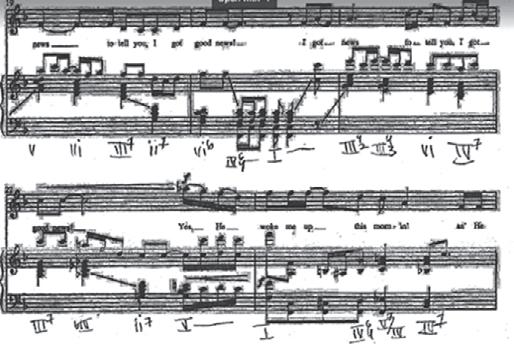
Brown, U. (2022). African American Songs: Who Should Sing Them? [Unpublished manuscript].
Holley, E. (2020, January 20). A Century of Affirming African American Musical Identity. Chorus America. https://cho rusamerica.org/article/century-affirming-african-americanmusical-identity
Jones, R. (2019). So You Want to Sing Spirituals: A Guide for Performers. Rowman & Littlefield.
Moore, R. (1992). The Decline of Improvisation in Western Art Music: An Interpretation of Change. International Review of the Aesthetics and Sociology of Music, 23(1), 61–84. https://doi.org/10.2307/836956
Smith, W. S., & Chipman, M. (2017). The Naked Voice: A Wholistic Approach to Singing. Oxford University Press.
Thomas, A. J., & Armstrong, A. (2007). Way Over in Beulah Lan’: Understanding and Performing the Negro Spiritual. Heritage Music Press.
Thomas, A. J. (June 4, 2009). African American Spirituals [Master class]. Hampton University Ministers’ Conference Choir Directors’ and Organists’ Guild Workshop, Hampton, VA, United States.
TEMPO 36 OCTOBER 2023
Excerpt 3. Improvisation in “Ain’t-a That Good News!” (measures 19-23).
STUDY CONTEMPORARY MUSIC EDUCATION AT BERKLEE
Dynamic Music Education for an Evolving World
> Create your future in music education.
> Study cutting-edge pedagogical practices.
> Explore new technologies and contemporary perspectives.
UNDERGRADUATE PROGRAM
• Bachelor of Music in Music Education
Teacher licensure program (PK–12, music)
Observe, assist, and teach in partner schools. Teach preschoolers in our KidsJam community music program.
> Learn from world-class arts educators.
> Apply innovative and relevant strategies to teach the students of today and tomorrow.
> Teach while you learn.
GRADUATE PROGRAMS
• Master of Music in Music Education
• Master of Music in Music Education (Autism Concentration)
• Graduate Certificate in Music Education and Autism
Distinctive programs that advance the art of teaching music


Unique autism concentration programs that prepare you to reach all learners
Offerings that bridge pedagogical theory and practice
Flexible schedule (summer, evenings, independent instruction)
Observe, assist, and teach in partner schools. Teach music to students with disabilities at the Berklee Institute for Accessible Arts Education.
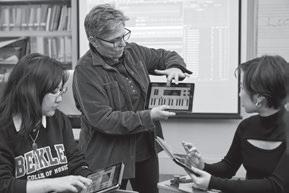
Learn More
Visit
berklee.edu/music-education
OCTOBER 2023 37 TEMPO
a class, meet faculty and students, and discover how you can create your future in music education at Berklee. To make an appointment, email bmurphy6@berklee.edu or call 617-747-2425.
Podcasting Across the Curriculum
Marjorie Lopresti Director of Content, MusicFirst marjorielopresti[at]gmail.com
School-age kids are huge consumers of podcasts. In 2021, there were 850,000 active podcasts, with over 48 million total episodes, available in over 100 languages. Over 51% of Americans report listening to podcasts. This demographic is trending younger every year. Educators who want to better engage students can capitalize on this trend. Kids want to create content in the same medium in which they consume it. Podcasting brings relevancy to every single subject area.
Experienced teachers across all grade levels and subject areas will attest that many students can tell what they have learned in greater detail and more quickly than they could write about it. Podcasts created in schools harness students’ ability to share what they know through speaking in a conversational way.


Contemporary podcasting began in the 1980’s with “audio blogs,” followed by Carl Malamud’s “Internet Talk Radio,” and additional online radio shows during the growth of mainstream internet use in the 1990’s. Those early audio blogs and shows were asynchronous and on demand, just like today’s millions of podcasts. In the period between 2000-2003, the advent of RSS syndication, mp3 format, the iPod, and iTunes, podcasting as we know it became the new standard. Use this link for a brief history of podcasting: https://www.njmea.org/s/Podcasting_Lesson1.pdf
“Podcasting Across the Curriculum” is the first-ever podcasting course for K-12 schools. Developed by Dr. Jim Frankel, founder and director of MusicFirst, the curriculum is applicable in most any classroom and for any subject.

Dr. Frankel’s vision was to help teachers empower their students by enabling the creative expression of what they have learned. The curriculum is a ready-to-use solution for teach-
ers with no recording, podcasting, or music composition experience, and is applicable for experienced music and technology teachers too. The course includes:
• 20 lessons with student handouts and assessments
• 20 full projects across a broad array of subject areas, with student handouts and assessment rubrics (math, science, history, language, physical education, arts, etc.)
• 10 bonus project ideas
The coursework starts with the origins of podcasting and includes exemplary podcasts on many subjects. Step by step, the teacher and learner alike are guided through strategies to develop podcast content and acquire the skills needed to record, edit, and distribute podcasts. Along with objectives, materials, instructional procedures, the teacher side of each lesson includes the International Society for Technology in Education’s “ISTE Standards” for students. https://www.iste. org/standards/iste-standards-for-students The student view in each lesson includes printable instructional materials, links to quality resources, lots of images, assignments, and projects.
Specific, detailed technology-related instructions for hardware and software are included in the course materials. Dr. Frankel recommends Soundtrap as the recording, editing, music composition, and audio production software. His top hardware recommendation is Focusrite’s Vocaster One Studio interface, which comes with a microphone and headphones. (The core content of the curriculum is applicable with any music production recording software and hardware.)
Recently, Dr. Frankel met with Dr. Lee Whitmore, Vice President for Education at the Focusrite Group, and Dan Behar, Global Channel Manager of Soundtrap for Education. They discussed how the synergy of curriculum, hardware and software can be transformational for students. Their wide-ranging discussion covered these broad questions:
TEMPO 38 OCTOBER 2023
Why Podcasting?
Podcasting is sometimes called the ‘duct tape’ of education. Purposeful audio recordings can bridge gaps in so many ways:
• Student ownership of learning
• Vehicle for creativity
• Check-in and connect with students; hear their voices –literally and figuratively
• Brings relevancy to every single subject area – kids are listening to podcasts on their own
• Alternative assessments to improve equity and comprehension, i.e. students with special needs or whose written language skills may not match their other achievement levels
• Assess understanding beyond formal written evaluations
• Build an ongoing portfolio to demonstrate and build on mastery
• Technology skills for making a podcast = career readiness in media production, a must-have for all fields of employment
Dan Behar (Soundtrap) outlined these additional imperatives for including podcasting in the mainstream curriculum:
• The 4c’s of 21st century learning: creation, communication, critical thinking, collaboration
• Collaborative project-based learning helps students develop hard and soft communication skills
• Speaking and listening standards
• Engagement in learning and communicating about students’ own learning (metacognition)
• Meeting students where they are: they want to create, and develop storytelling and narrative-building skills
• Amplifying student voices in public, or in private
• Elevating student perspective and interdisciplinary learning
• Community building: long form audio products can work with place-based education (PBE) and culturally responsive teaching (CRT) goals.
Why Focusrite?
Millions of musicians and home recording artists are familiar with Focusrite and their Scarlett line of audio interfaces. Dr. Lee Whitmore outlined some of the main reasons Focusrite is becoming popular in school settings. Their products are known for:
• Exceptional fidelity (quality sound capture and playback)
• Best-in-class reliability and durability (crucial in school settings!)
• Vocaster interfaces, microphones and headphones provide a “low floor and high ceiling” – ease of use, superior results.
• Sleek, simple, error-eliminating design and cabling connections
• Built-in audio enhancement presets – a huge advantage for novice and experienced podcasters.
The Vocaster One and Vocaster Two were designed specifically with podcasting in mind. Both accommodate a “host” microphone, ‘call in’ guests, and have handy ‘mute’ buttons. The Vocaster Two includes two microphone ports plus a Bluetooth audio input for easy capture of sound from a remote guest or other devices. The Vocaster One Studio and Vocaster Two Studio both include dynamic microphones and high-quality headphones along with the interface. Visit https://focusrite.com/ en/vocaster for more information and videos.
Soundtrap
Why Soundtrap?
“Podcasting and music are like ingredients in the gumbo of life. They go hand and hand.” – Dan Behar, Soundtrap
Soundtrap is online/cloud-based recording and music production software. It’s visually engaging, powerful, and intuitive to use. Many music educators used Soundtrap during pandemic-related school shutdowns because of its ease of use and collaboration features. The education version, SoundtrapEDU provides the privacy and safety controls that teachers and schools demand in addition to the robust experience of the “consumer” version of Soundtrap:
• Built-in ‘podcast’ template, so anyone can start recording right away.
• Loop library enables anyone to create custom music—essential for a quality, custom podcast!
• Collaboration with your “school” network only
• Teacher-determined and assigned project templates
• Advanced audio editing features and effects with simple controls

• Transcription Tool (voice recognition) provides accessibility and ease of editing
• Translation Tool
How can you get the curriculum?
• Existing MusicFirst Classroom customers already have free access to Podcasting Across the Curriculum in the MusicFirst Library.
• Soundtrap Education customers can visit musicfirst.com/ podcasting to request access.
• Any educator – not just music teachers - can visit musicfirst.com/podcasting to request access and a free trial of MusicFirst with Soundtrap.
OCTOBER 2023 39 TEMPO
• Need some gear to get started? Contact MusicFirst for education pricing on Focusrite products. Access to the curriculum is included at no additional cost.
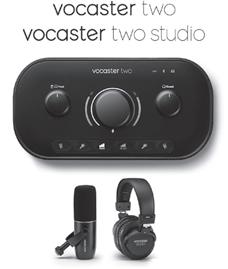
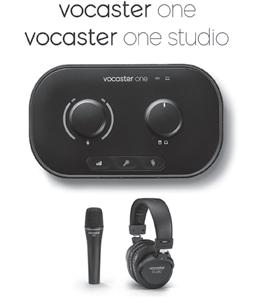
• FREE TRAINING will be available online with Dr. Frankel. Sign up at musicfirst. com/podcasting.
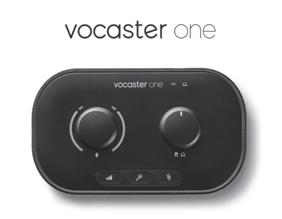
Which podcasts do you enjoy and recommend?
For students, educationally rich and ageappropriate podcasts provide excellent models for learning and as models for their own projects. Here are a few recommended by Dr. Frankel:
• But Why? A Podcast for Curious Kidss (Vermont Public Radio) https://www. vermontpublic.org/podcast/but-why-apodcast-for-curious-kids
• TED Talk Daily – What silence can teach you about sound: https://open.spotify. com/episode/6esWAhPKqhkxeNDXNXIVS M?si=MwGkvY_tSkOQ_Y0p0UTFUw
• Radiolab for Kids – Dark Side of the Earth: https://open.spotify.com/episode/1qjHA XGtmWdri6TG1bOubM?si=N27m72n3Rp
qBiUwa21HuiA
• StarTalk Radio with Neil DeGrasse Tyson: https://open.spotify.com/show/1mNsu XfG95Lf76YQeVMuo1?si=5a7ca916ab98 47b4
• Find more teacher-approved podcasts for kids here: https://www.weareteachers. com/best-podcasts-for-kids/
These podcasts are recommended for adults, musicians, and educators:
• Ten Songs That Made Me https://open.spotify.com/ show/3sRrtlRiByFrOC49vPwP8L
• BBC: Song Exploder https://www.radiotopia.fm/podcasts ?gclid=Cj0KCQiA99ybBhD9ARIsALvZavWp7ib6cuqZfacPS dMuf4quAxxivIH9r_7TC7_rkHpJ_c_itTzdJ1UaAh_PEALw_ wcB
• Invisible Arts with Richard Gibbs https://podcasts.apple. com/us/podcast/invisible-arts/id1528075322
• Radiolab https://radiolab.org/episodes
• Freakonomics Radio https://freakonomics.com/podcasts/
• This American Life https://www.thisamericanlife.org/
• Marketplace hosted by Kai Ryzdal https://www.marketplace.org/shows/
• How to Be Perfect (with Michael Schur) https://podcasts. apple.com/us/podcast/how-to-be-perfect-with-michaelschur/id1544098624?i=1000579916929
Whether you are a podcast connoisseur, music techie, or completely new to audio recording and podcasting, “Podcasting Across the Curriculum” provides a detailed roadmap for success. From the first lessons on the origins of audio storytelling, to strategies for crafting quality podcasts, step-bystep recording and editing, then guidance on distribution, you and your students will gain confidence in creating engaging and informative podcasts, essential technical and collaborative skills, and new avenues for expression. Happy podcasting!
Marjorie LoPresti is Director of Content for MusicFirst and co-author of Practical Music Technology (Oxford University Press). She has over 30 years’ experience teaching elementary, secondary, and undergraduate music with technology. Marj has presented clinics on general technology, brain-based learning, music technology integration and assessment to thousands of educators and is honored to have been named NJMEA Master Music Teacher and TI:ME Music Technology Teacher of the Year.
Dr. James Frankel is the Head of Digital Education for Wise Music and Director of MusicFirst. Previously, he was the Managing Director of SoundTree, and before that he was the instrumental and general music teacher for 15 years in New Jersey Public Schools. Jim is a widely published author in various state, national and international journals of music education. He is the author of The Teachers Guide to Music, Media & Copyright Law, co-author of YouTube in Music Education, contributing author for Critical Issues in Music Education and co-author of Making Music with GarageBand & Mixcraft. In addition to his writing, Jim is a highly sought-after clinician and keynote speaker in the local, national and international music education community. He is on the Board of Directors for TI:ME and is the past president of ATMI.
Dr. Lee Whitmore is a music, audio, creative digital media, and education thought leader. He’s the Vice President for education at Focusrite Group, which includes Focusrite, Novation and Ampify Music, Sequential and Oberheim, ADAM Audio, Martin Audio and Optimal Audio, Linea Research. With a career that spans three decades, his professional assignments have included leadership positions at music industry companies Avid, Sibelius, and Korg USA, as well as the GRAMMY Music Education Coalition and Berklee College of Music.
Dan Behar, Global Channel Manager, Soundtrap for Education has been in edtech for nearly five years, delivering creativity solutions to classrooms around the world. He is most proud of Sountrap’s work to help give students a voice through podcasting and music creation. Across subjects and grade levels, Soundtrap helps educators teach life skills with lasting positive impacts.
TEMPO 40 OCTOBER 2023


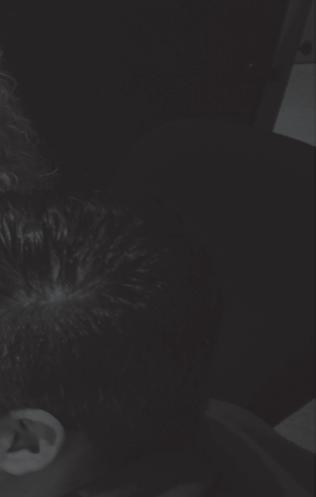



OCTOBER 2023 41 TEMPO HELP SHAPE the Future of Music AUDITION INFORMATION: Visit millersville.edu/music | Email music.admit@millersville.edu | Call (717) 871-4701 THE TELL SCHOOL OF MUSIC | MILLERSVILLE UNIVERSITY OF PENNSYLVANIA Millersville University is accredited by the National Association of Schools of Music (NASM), 11250 Roger Bacon Drive, Suite 21, Reston, VA 20190-5248. Millersville University is an Equal Opportunity/Affirmative Action institution. A Member of Pennsylvania ‘s State System of Higher Education. 8917-MUSIC-0623-JR EXPERIENCE STATE-OF-THE-ART FACILITIES Ware Center (Lancaster) | Winter Center (Main Campus) AUDITION DAYS Fall 2023 8/22/23 • 11/14/23 • 11/28/23 Spring 2024 1/23/24 • 2/6/24 • 2/10/24 2/13/24 • 2/20/24 • 2/24/24 2/27/24 • 3/12/24 • 3/19/24 3/26/24 • 4/9/24 UNMASK THE WORLD OF MUSIC BUSINESS TECHNOLOGY: 11/9/23 • 3/28/24 MUSIC MAJOR FOR A DAY: 10/26/23 • 3/14/24 B.S. IN MUSIC INDUSTRY Concentrations in Music Production, Management and Live Audio Production (Choose one or more!) Perform in Classical and/or Commercial Ensembles B.S.E. IN MUSIC EDUCATION Certification in PreK-12 in general music, band, choir and orchestra Extensive teaching experience each semester beginning in 2nd year B.A. IN MUSIC (General and Performance Concentrations) Dual-degree options with Performance Concentration and Music Industry or Music Ed Classical and/or Commercial Performance Tracks CERTIFICATE PROGRAMS STAND OUT FROM THE CROWD. ADD A CERTIFICATE TO YOUR CHOSEN DEGREE PROGRAM! Kodály Certificate Technology in Music Education Certificate Modern Band Certificate
2023-2024
ALL STATE BAND SOLO LIST
InstrumentSolo
Piccolo Sonata in a minor, mvts 3 & 4
ComposerPublisher
Bach Hal Leonard HL50334590 (from Sonatas for Flute and Piano Vol. 1)
Flute Concerto in G, mvts 1 & 2
Oboe Sonata
English Horn*Sonate, mvt 1
Eb Clarinet*Sarabande and Gigue
Bb ClarinetConcertino, Op. 26
Eb Alto Clarinet*Sonata No. 6
Bb Bass ClarinetAndante & Allegro
Contra Clarinet*Sonata No. 6
Bassoon Concerto, mvts 1 & 2
Bb Sop. Sax*Fantasie-Pastorale
Eb Alto SaxTableau de Provence, mvts 1 & 4
Bb Tenor SaxSolo de Concert
Eb Bari SaxSonata, mvts 3 & 4
MozartKalmus K03723
Saint-SaensHal Leonard HL50565974
HindemithEurAm/Schott ED3672
CorelliHal Leonard HL04476869
vonWeberCarl Fischer W1893
VivaldiBarnhouse 083-0092-13
DesportesSouthern Music SS148
VivaldiBarnhouse 083-0092-13
Mozart/WeisbergInternational 2161
DemerssemanEthos Publications
MauriceHanry Lemoine HL23953
SingeleeHal Leonard 04477549
CaravanEthos Publications
Bb TrumpetSonata KennanAlfred TS0026
Horn Villanelle (from Solos for Horn Player) Dukas/JonesSchirmer/Hal Leonard HL50330050
TromboneAndante & Allegro
Bass Trombone*Sonata, mvts 2 & 3
EuphoniumSonata in G
Tuba Suite for Tuba
Barat Southern SS361
McCartyEnsemble Publications ENS014
Telemann/RoselleCimmarron CM0809
HaddadShawnee Press LA0066
Harp* Chanson dans la Nuit (from Method for Harp)Lawrence/SalzedoLyra Music/Hal Leonard HL50328070
Piano* Waltz in Eb, Op. 18
ChopinG. Henle Verlag HN131
Timpani 4 Drum Etudes, #2 & #3: pgs 29-32Fink
Studio 4 Music (from Musical Etudes for the Advanced Timpanist)
Mallets Rain Dance
Battery Percussion
Gomez/RifeSouthern ST695
Snare Etude No. 2 from 12 Studies for the Drum DelecluseLeduc AL23410
KeyboardPolonaise WhaleyMeredith Music (from Musical Studies for the Int Mallet Player)
*Instruments will be used as needed.
TEMPO 42 OCTOBER 2023
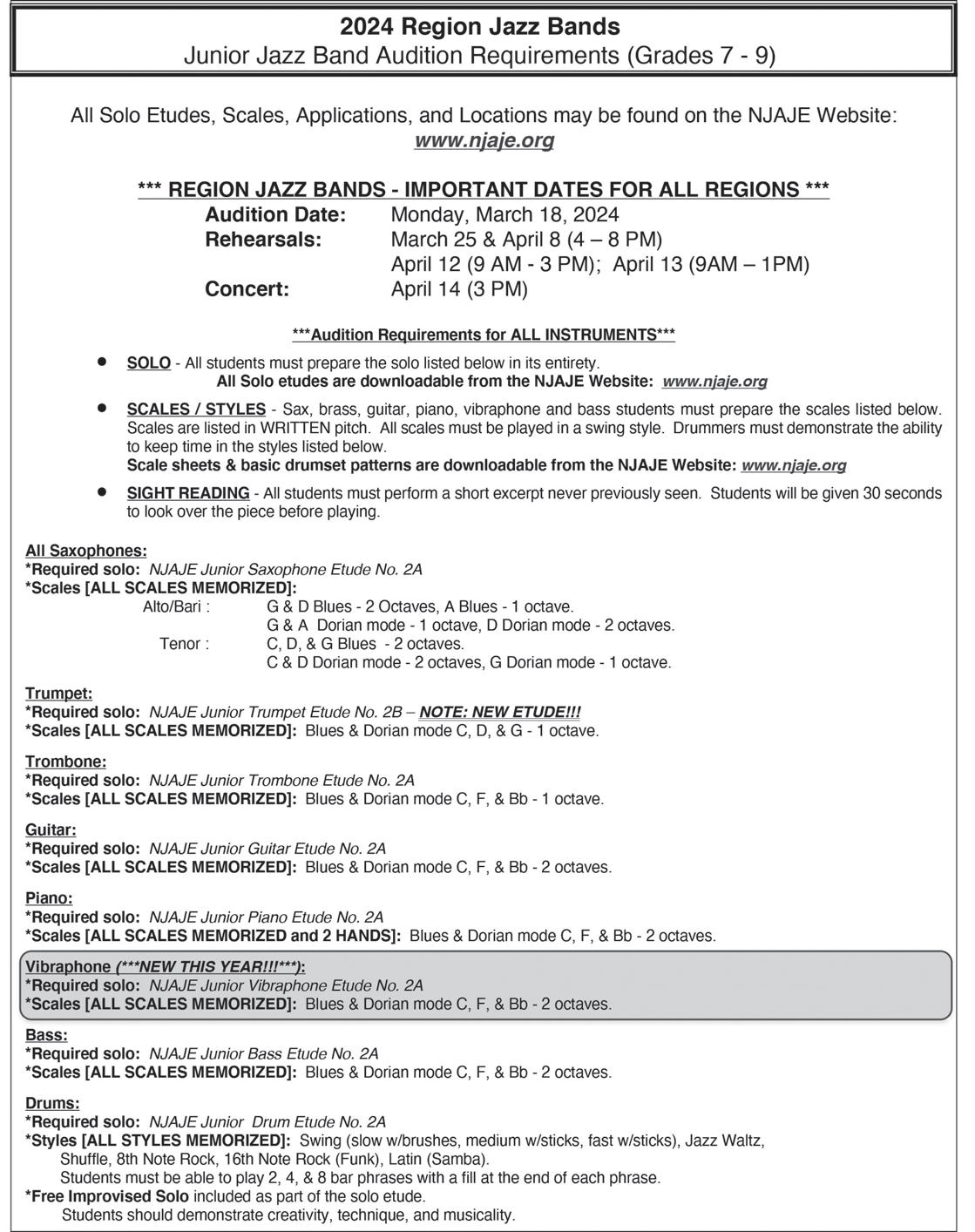
OCTOBER 2023 43 TEMPO
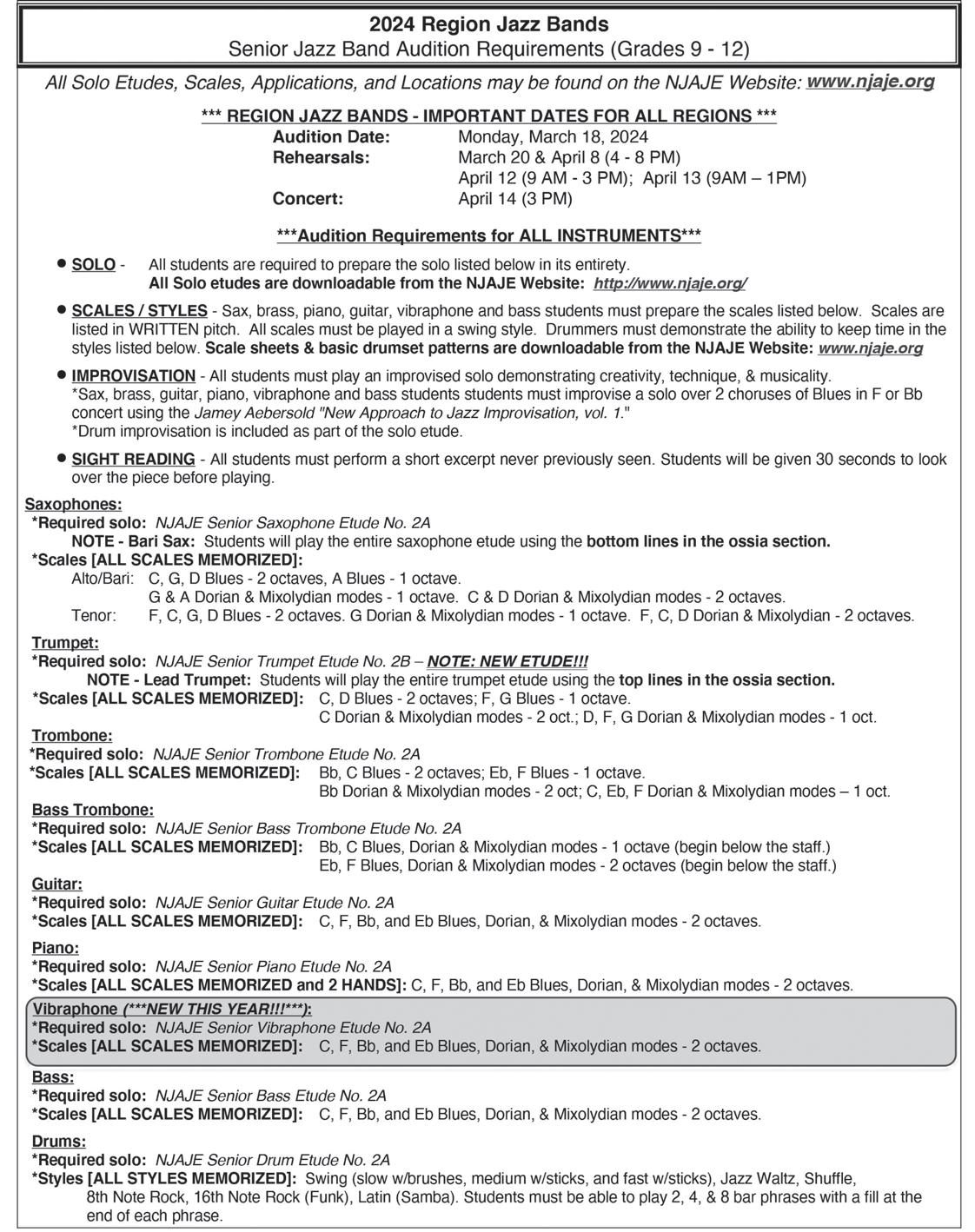
TEMPO 44 OCTOBER 2023
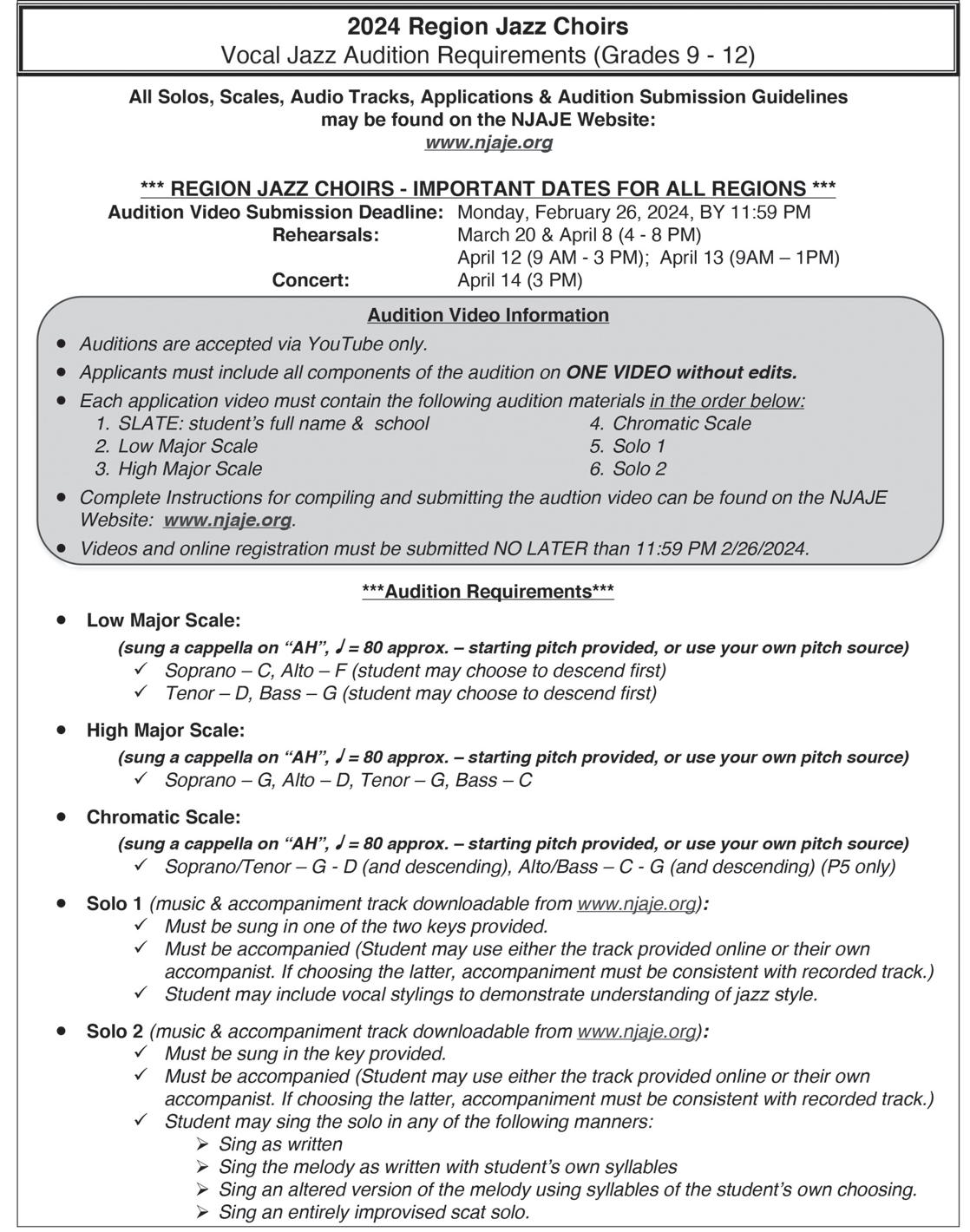
OCTOBER 2023 45 TEMPO
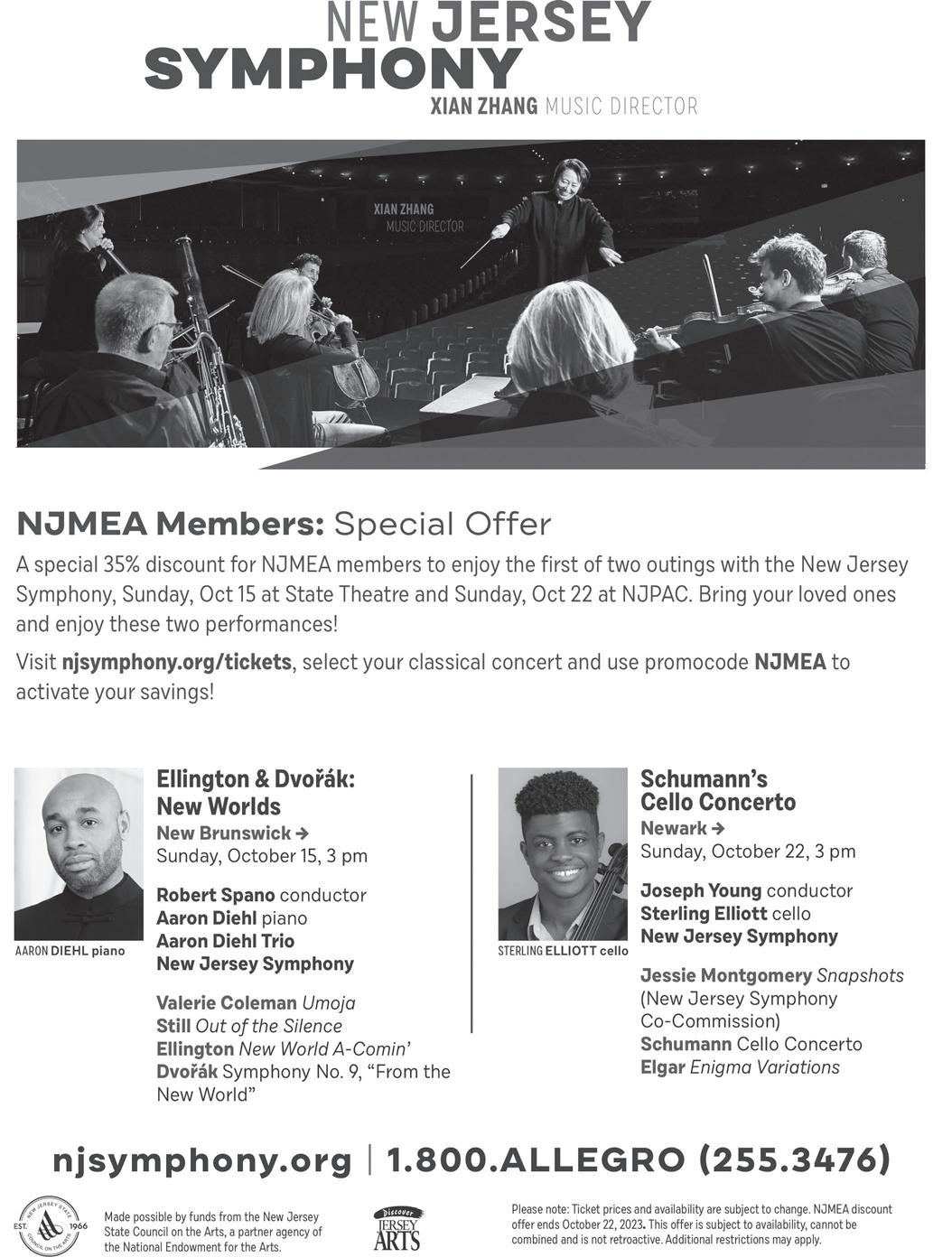
TEMPO 46 OCTOBER 2023
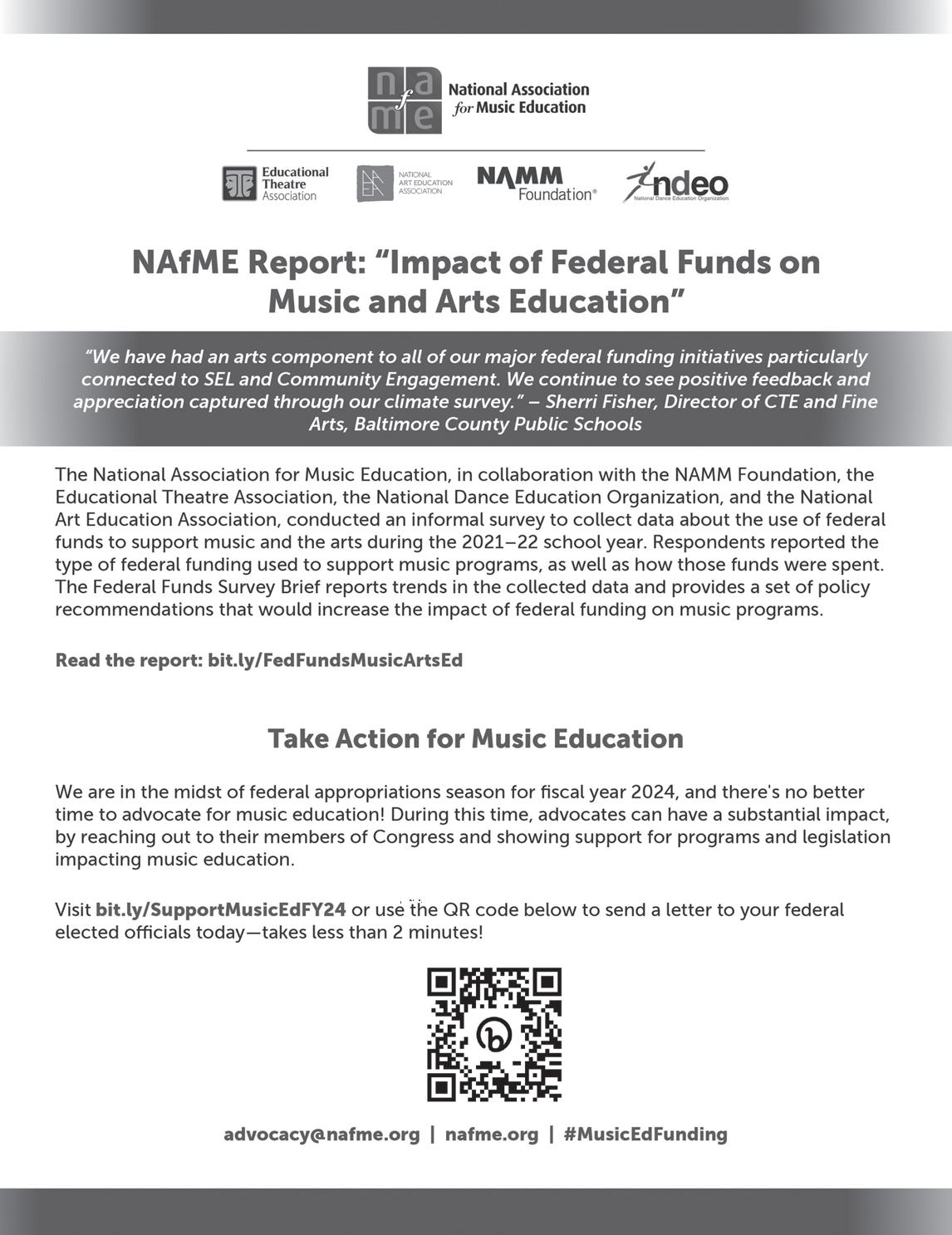
Boyer College of Music and Dance
WELCOME , MAESTRO!
Maestro José Luis Domínguez joins the Boyer College instrumental faculty as Associate Professor of Orchestral Studies and Conducting and Music Director of the Temple University Symphony Orchestra.
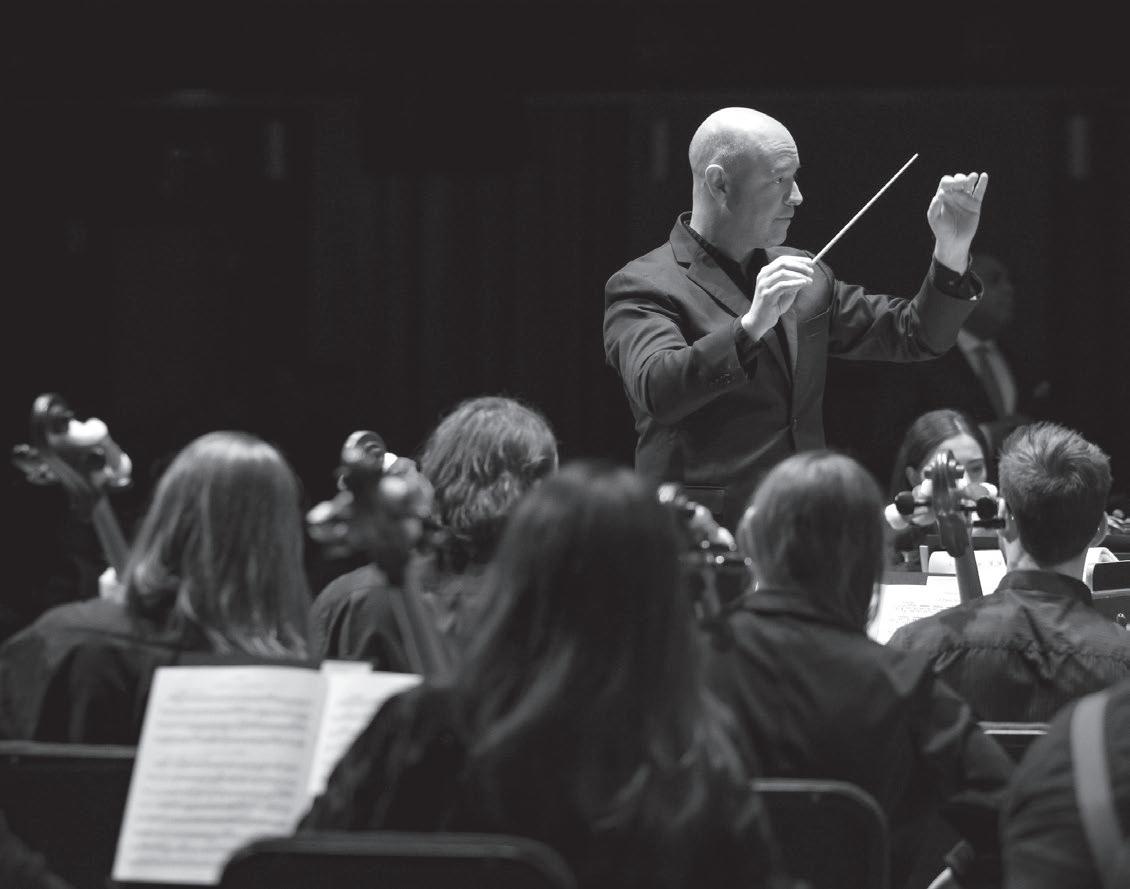
SEE MAESTRO DOMÍNGUEZ ONSTAGE
Temple University Symphony Orchestra
November 2 – Temple Performing Arts Center
November 30 – Temple Performing Arts Center
December 8 – Temple Performing Arts Center
March 24 – Verizon Hall, Kimmel Cultural Campus

April 25 – Temple Performing Arts Centerr
Temple University Opera Theater
Handel’s Ariodante
April 5, 7, 9 – Tomlinson Theater
Contact admissions: (215) 204-6810 or boyer@temple.edu boyer.temple.edu
@boyercollege
TEMPO 48 OCTOBER 2023
NJSMA
North Jersey School Music Association
www.njsma.com
Greetings to all our music educators in the State. I hope the start of the school year is going well and I am looking forward to an amazing year ahead. My name is Anthony Lanzerotti and I am honored and humbled to have been selected as the 2023 NJSMA Region I President. It is the fine work of all the music educators that make a positive impact on our students in our region.
I would like to thank Austin Vallies (choral division) and Diana May (past president) for their service to our organization. As you pursue new adventures, thank you for your leadership and guidance. I would like to welcome our new executive board members for 2023-2024: Lyn Lowndes (president elect) from Richard Butler School, and Elizabeth Monkemeir (recording secretary) from The Peck School. I would also like to welcome our new division chairs, Leonid Weismantel (choral division) from Clifton High School, and Christopher Zwarych (band division) from Hackettstown Middle School. On behalf of the executive board, we welcome you and look forward to working together to create a strong partnership.
The NJSMA Elementary Music Division proudly offers exceptional workshops and events for all NJMEA elementary general/choral music educators. 2023-2024 events include a workshop featuring internationally renowned clinician Lynn Kleiner on Monday, October 9, 2023. This will be followed by "It's Elementary, My Dear,” a Saturday workshop in early 2024, and then the NJSMA Choral Celebration for 3rd-7th grade treble choirs on May 29, 2024.
As always, there will be much more. For additional information, including registration links and details, please visit the NJSMA Elementary Music Division webpage: https:// njsma.org/elementaryhome/.
We are excited to be running our high school and intermediate region ensembles for choir, band and orchestra. We will also be having our high school, intermediate, and elementary festivals. Please see our website for more information.
At this time, we are still searching for an orchestra audition chairperson. Please reach out to our orchestra division (orchestra[at]njsma.org) if you are interested. The Guitar festival is in need of managers and conductors. If you are interested, please reach out to Jordan Peters (diversity[at] njsma.org).
Our events can only run with the help and support of all of you. We are always looking for volunteers with any level of experience to serve as site host, audition chair, manager and committee members. If you wish to be involved, we have a spot and will work alongside you throughout the entire process.
Welcome to any new teachers in our region and to those who have not been active as NJSMA members. If you are reading this or know someone who desires to join us, please have them reach out to our corresponding secretary (publicity[at]njsma.org), or fill out the contact form on our website. All relevant information about our region is on the website (njsma.org). The calendar section is up to date with all of our confirmed events as of this publication. Contact information for all executive board members/divisions is listed under the officers’ section.

I am looking forward to another successful year and working together with all the fine music educators in northern New Jersey. Please reach out if you have any questions.
Anthony Lanzerotti NJSMA President president[at]njsma.org
CJMEA Central
For those of you who I have not had the opportunity to meet, let me briefly introduce myself. My name is Brian Williams, I am the choir director at Robbinsville High School and have been working in public education for over a decade. Throughout my time as a secondary educator, my students have always thoroughly enjoyed their experi-
OCTOBER 2023 49 TEMPO
Jersey Music Educators Association
www.cjmea.org
ences with CJMEA regional and honors ensembles. These groups provided life changing opportunities to my young musicians, so I am excited to be able to help behind the scenes. Over the next two years, my primary goal is to expand our base of schools and members by making information more easily accessible to teachers and prospective students alike.
Please stop by our beautiful website, CJMEA.org, where you can find all of the ensembles and professional development opportunities that we have available for you this year. Additionally, under each ensemble’s page you’ll see a generalized breakdown of deadlines to help you best plan out when you’re chatting with your students about auditions.
I look forward to the opportunity to work with each of you over the next two years. Please know I am here to help you, please feel free to reach out via email if there’s anything I can do!
Have a wonderful school year,
Brian Williams CJMEA President president.cjmea[at]gmail.com
SJCDA
South Jersey Choral Directors Association
www.sjcda.net
The South Jersey Choral Directors Association (SJCDA) Board of Directors worked throughout the summer to plan our activities for the 2023/24 school year and we are looking forward to a successful year of choral activities in Region III.
We began the year with our annual General Membership Meeting and Reception at White Horse Winery on September 11. Conductors for our honors choirs presented their programs and the executive board discussed new opportunities and initiatives for SJCDA members. In addition, our membership had the opportunity to connect with their colleagues and share ideas about the upcoming school year.
Our 66th Annual South Jersey High School Choral Festival will be held at Investors Bank Performing Arts Center at Washington Township High School on January 27 and 28, 2024. Our Senior High conductor is Laurie Lausi of Cherry Hill East High School and our Junior High conductor is Elisa Contrevo of Glassboro High School. Auditions for these choirs will be held on Saturday, November 18 at Clearview Regional High School.
Our 41st South Jersey Elementary Festival Choral Concert will be held on March 2, 2024 and will be conducted by
Sarah Mickel of Pitman High School.
Full concert programs for all three honors choirs as well as bios of our conductors are available on our SJCDA website which has been recently updated by our webmaster, Hope Knight.
We look forward to another exciting year working with the teachers and students throughout South Jersey and encourage you to check our website for the latest updates, www.sjcda.com.
Cristin Introcaso SJCDA President cintrocaso[at]collsk12.org
SJBODA
South Jersey Band and Orchestra Directors Association
www.sjboda.org
Welcome Back! Our first membership meeting for this school year will be held on Wednesday, October 11, 2023. This breakfast meeting will take place at Seven Star Diner in Sewell at 9:00 AM. There is no fee to attend the meeting. Please notify Sue Mark (609-457-0590 or sjbodapresident[at]gmail.com) if you plan to attend. At this meeting, our audition information and our online registration process will be explained, and our modified junior high band and junior high string audition requirements for this year will be discussed in detail.
Welcome our new officers, elected at our spring meeting: John Drechen, President-Elect (Lower Cape May Regional HS, Joe Jacobs, Secretary (Ventnor MS, retired), Rich Beckman, Treasurer (Cherry Hill Public Schools), and Phil Senseney, Auditions Chair (Southern Regional MS, retired). Lori Ludewig (Collingswood/Oaklyn) will serve as Past President and Sue Mark (Rosa International MS) is our President.
Auditions for the 2024 All South Jersey Orchestra, Wind Ensemble, Symphonic Band and Junior High String Ensemble will take place on Saturday, December 9, 2023, at Absegami HS. Thank you to Patrick O’Keefe, who will host this event. Audition information, applications and directions are available on our website. The first rehearsal for these ensembles will take place on Saturday, December 16th, at Cinnaminson HS. Nick DiSalvio will be our site host for this rehearsal.
Our 2024 Orchestra conductor this year is Kenneth Bean (Symphony in C). Hester Hasheian (Glassboro Public Schools) will conduct our Junior High String Ensemble. The
TEMPO 50 OCTOBER 2023
Wind Ensemble will be conducted by Trish Cornett (Temple University) and Jim Mark (Cherry Hill West HS, retired) will conduct the Symphonic Band. Carrington Thompson (Eastern Regional HS) is our Strings Coordinator and Amanda Lakits Porco (Hamilton Twp. Schools) is our High School Band Coordinator.
The Junior High Band auditions will take place on Saturday, January 27th, at Southern Regional Middle School. Andrew Wright will be our event host. Audition information is available on our website. Joe Jacobs (Ventnor MS, retired) and Jon Porco (Deptford Twp. MS) are the Junior High auditions co-chairs. Nancy Robinson (Linwood Public Schools, retired) is our Junior High Band Coordinator.
The South Jersey Band and Orchestra Directors Association offers many opportunities for instrumental music teachers to expand their involvement and expertise as music educators. We provide excellent vehicles for professional development including conducting, coaching,
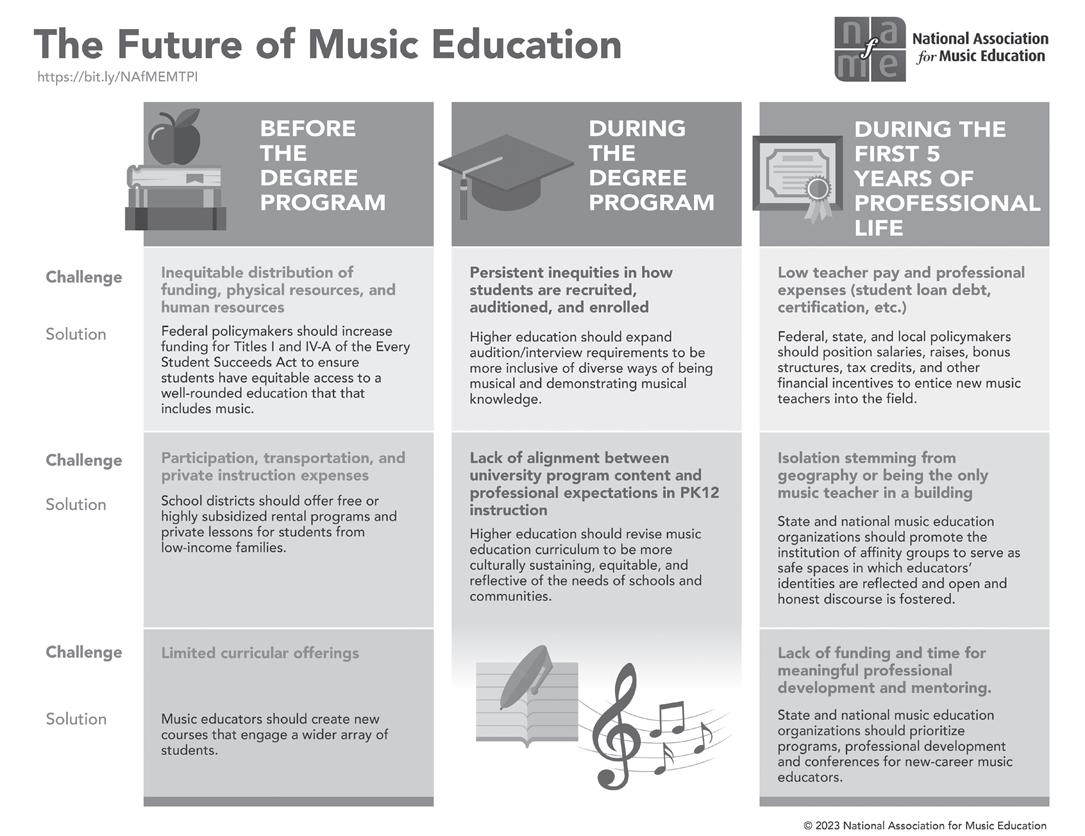
and managing our ensembles. Many teachers have gained wonderful ideas and strategies by observing rehearsals and meeting with colleagues. There are plenty of excellent performing opportunities for your students and ensembles to enhance your school music program. We encourage all music teachers to take advantage of the wonderful resources offered by SJBODA this year. For additional information, please contact Sue Mark at sjbodapresident[at]gmail.com or 609-457-0590.
We encourage you to check our website, which is maintained by Derek Rohaly (Mainland Regional HS), for the latest SJBODA updates. www.sjboda.org
We wish everyone an exciting and successful year.
Sue Mark SJBODA President sjbodapresident[at]gmail.com
OCTOBER 2023 51 TEMPO

NJMEA RESOURCE PERSONNEL
Choral
Composition
Diversity/Equity/Inclusion/Access...................................Isaiah
Marching
wmcdevittnjmea[at]gmail.com
Middle/Junior High Band Festival ...................................... Nancy Clasen ................................................nancyclasen[at]gmail.com
Middle/Junior High Choral Festival ............................ Donna Marie Berchtold....................................... firesongwed[at]gmail.com
NJMEA Historian............................................................. Nicholas Santoro ................................................... n31b13[at]gmail.com
NJMEA State Conference Exhibits Chair............................. Nancy Clasen................................................ nancyclasen[at]gmail.com
NJMEA State Conference Manager.................................... Marie Malara ....................................................... malara97[at]aol.com
NJMEA/ACDA Honors Choir............................................... Kaitlyn Reiser......................................................... kreiser[at]spfk12.org
November Convention – NJEA ...........................................Nancy Clasen............................................... nancyclasen[at]gmail.com
Opera Festival Chair ................................................... Donna Marie Berchtold....................................... firesongwed[at]gmail.com
Orchestra Performance Chair............................................ Susan Meuse............................................... susanmeuse[at]gmail.com
Orchestra Procedures Chair................................. Craig Stanton & Elisabeth Sato...............................asoprocedures[at]gmail.com
Research........................................................................... Preston Wilson..................................................... gpwilson[at]rider.edu
Students with Special Needs............................................ Maureen Butler................................ maureenbutlermusic[at]gmail.com Supervisor of Performing Groups.................................... Wayne Mallette mallette.njmea[at]gmail.com
Tri-M................................................................................... Yale Snyder................................................snyder.njmea[at]gmail.com
REPRESENTATIVES/LIAISONS TO AFFILIATED, ASSOCIATED AND RELATED ORGANIZATIONS
NJ American Choral Directors Association .......................... John Wilson...................................................jwilson[at]brrsd.k12.nj.us
Governor’s Award for Arts Education .............................. Wayne Mallette .......................................... mallette.njmea[at]gmail.com
NJ Association for Jazz Education ................................... Darrell Hendricks.......................................dhendricks.njaje[at]gmail.com NAfME.............................................................................
NJ Music Administrators Association ...............................
William McDevitt wmcdevittnjmea[at]gmail.com
Alfred Hadinger ................................. alfred_hadinger[at]nplainfield.org
NJ Retired Music Educators Association ............................ Ronald Dolce .......................................................rdolce561[at]aol.com
Percussive Arts Society........................................................
Joe Bergen ..............................................joe[at]mantrapercussion.org
COMMUNICATION SERVICES/PUBLIC RELATIONS
Executive Director/TEMPO Editor/ TEMPO Express/NJMEA Website....................................
William McDevitt ..................................... wmcdevittnjmea[at]gmail.com
OCTOBER 2023 53 TEMPO
Area of Responsibility Name Email Address Administrative Matters ................................................... David Westawski..................................... westawski.njmea[at]gmail.com All-State Coordinator....................................................... Joseph Cantaffa jcantaffa[at]rocknrollchorus.com Association Business ....................................................... William McDevitt ...................................... wmcdevittnjmea[at]gmail.com
Performance Chair...................................................Patrick O'Keefe............................................patrickaokeefe[at]gmail.com Band Procedures Chair.....................................................Tyler Wiernusz.................................twiernusz[at]clearviewregional.edu
Band
Performance Chair..................................................Brian Williams............................williams.brian[at]robbinsville.k12.nj.us
Procedures Chair...................................................... Ken Bryson............................................. kennethbryson[at]gmail.com
Choral
Contest ........................................................ Andrew Lesser.......................................... andrew.lesser[at]yahoo.com
C. Mason.................................................deia.njmea[at]gmail.com Jazz Procedures Chair..................................................... Darrell Hendricks...................................... dhendricks.njaje[at]gmail.com
Band Festival Chair ............................................ Nancy Clasen................................................ nancyclasen[at]gmail.com Membership................................................................... William McDevitt
This column salutes the lives and careers of recently departed colleagues. It is the way NJMEA and NJRMEA can express appreciation for the work that they have done and the lives that they have touched. We mourn their passing and salute their contributions, which are the basis for music education in the state of NewJersey.
Dr. Arthur Frank
Dr. Arthur Frank passed away on Thursday, March 30, 2023 at his home in Pennington at the age of 90. He was a noted composer and music teacher.
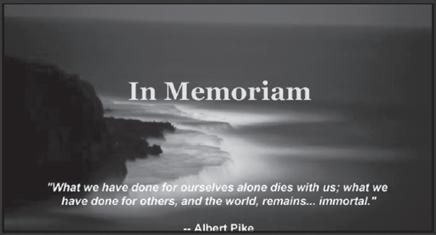
Born on February 22, 1933 in Brooklyn, NY to Gertrude and Hy Frank, he was a graduate of Trenton State College, class of '54 and was president of the class for three years. He studied percussion at the Julliard School of Music in New York City where he studied with Saul Goodman of the New York Philharmonic, achieved his Masters degree in Music Composition at The College of New Jersey and his Doctor of Musical Arts Degree at Temple University –the first recipient to receive this degree.
Art began his career as a music teacher and band director at Hamilton West High School. After being inducted into the Army in 1956, he taught at their Band School. His Army Combo won a competition which afforded them a chance to entertain Troops around the world. He later became choir director at Steinert High School in Hamilton, NJ.
He then moved on to Rider University from 1962-1969, serving as an Assistant Professor, Choir Director, Musical Director and conductor of Famed, "Theater 59", chosen for 2 years by the USO, to package tours to entertain GI's throughout Europe. In 1964 he became the First Chair of the Fine Arts department at Rider University. In 1969 he joined the faculty of the Department of Music Education at Temple University, where he retired as Professor Emeritus after 27 years, teaching over a thousand students.
Art is survived by his loving wife of 66 years, Roberta M. Frank, his sons, Mitchell Frank, Bruce Frank (Kimberly Leemaster), Greg Frank (Robin), and his 9 grandchildren: Benjamin Frank (Anna), Andrea Frank, Robert Frank, Leah Frank, Hannah Frank (Logan McBride), Alison Frank (John Edenhofner), Natalie Frank.
Robert M. Kearns
Robert M. Kearns of Oakland, NJ, passed away Friday, May 26, 2023, a week before his 85th birthday, with family by his side.
Born in Orange, New Jersey, Robert and his four siblings grew up in Sea Girt, just blocks from the ocean. His true passion was all things music, especially piano.
After graduating from St. Rose High School, Belmar, NJ in 1956, Robert earned his BA in music from Montclair State Teachers College and then went on to earn his Master's Degree in music from Trenton State College. He shared his love of music with countless students during his 40+ year career as an elementary school music teacher, encouraging each child to find his/her voice, learn to play an instrument, and most of all to have fun with music. He remained musically active in the summers, teaching piano and picking up other gigs, including one as summer stock music director for the Ridgewood High School New Players in the early '80s.
Robert is survived by his beloved children, Michael Kearns of Ohio and Jennifer Ruppert of Maryland; four cherished grandchildren, Rebecca, Matti, David, and Johnny, all of Maryland; his partner, Leigh Meek-Mockel of Fair Lawn, his brother, Tom Kearns (Alina); his sisters, Mary Jo Kearns, RSM and CJ Walsh; nephews Joe Kearns (Amy) and Chris Walsh; niece Jean Marie Walsh; and many extended family members.
Joseph David Lerch
Joseph David Lerch age 56 years of Gibbstown died suddenly on Friday April 7, 2023 in Our Lady of Lourdes Hospital, Camden with his family by his side. Joe was born in Woodbury, raised in Paulsboro and was a 1985 graduate of Paulsboro High School. He then attended Glassboro State College; while attending college he as-
TEMPO 54 OCTOBER 2023
sisted with the PHS music program and also did his student teaching at Gateway Regional High School. After graduating in 1989 with a degree in Music Education, he started his teaching career in Deptford Township. Joe then worked in the music program for fifteen years in Washington Township; moving to Collingswood High School to become Director of Bands where he was still teaching. He was a professional musician in the community playing guitar, bass and percussion. Joe also was an avid reader and liked listening to and playing music.
He is survived by his wife, Robin Lerch (nee Sharp) of Gibbstown and his children, Christopher and Jordaine Lerch of Gibbstown. Joe was predeceased by his parents, Joseph F. and Alice Lerch.
Wilbur W. Lewis
Wilbur W. Lewis, Jr. died Monday, June 26, 2023, at Robert Wood Johnson University Hospital in New Brunswick. He was 68.
Born in Passaic to the late Wilbur W. and Doris (Dunn) Lewis, he lived in New Brunswick before moving to North Brunswick in 1998. He was a music teacher in the Elizabeth Public School system and Jersey City Public Schools for 11 years before retiring in 2014. Prior to that he worked as an adjunct professor for Bergen and Middlesex County Colleges.
He was a member of the Bucks County Gilbert and Sullivan Society, the American Mandolin and Guitar Summer School and the New York Mandolin Orchestra. He worked as a Director of Music in several churches over the years.

He was a graduate of Luther College of the Bible & Liberal Arts, Montclair State College, and Mason Gross School of the Arts at Rutgers University. He was a skilled musician in many stringed instruments and a trained bass singer.
Wilbur was known for his love of music, used bookstores, and long walks with his golden, Burt. He was relentlessly proud of his children and he was his wife's biggest fan. He had a great sense of humor with a contagious laugh. He loved cooking, but especially cooking with and for friends and family. He will be missed dearly.
Surviving are his wife Annette R. Mulholland; his son Samuel Lewis and his wife Vaishali Bhatia of Seattle, Washington; his daughter Danielle Lewis of North Brunswick; two brothers – Michael Lewis and his wife Donna of Croghan, New York and Bryon Lewis and his wife Nancy Mudd of Winchester, Virginia; two sisters – Cindy
List and her husband Willie of Kenvil and Loretta Larkin of Las Vegas, Nevada; and his brother-in-law and sisterin-law Brian and Roseann Mulholland of Port Jefferson Station, New York.
Carl C. Wilhjelm
Carl C. Wilhjelm, 94, a resident at Cedar Crest Senior Living in Pompton Plains, passed away peacefully on March 18, 2023.
Carl grew up in the Philadelphia area. He graduated from West Chester University where he met his wife of 74 years, Alice Snyder. He went on to be a renowned and decorated music educator in school districts throughout New Jersey and Pennsylvania including Haddonfield, Lewisburg, Pequannock Township, Randolph, and Kinnelon. He was choir director at Moorestown Presbyterian Church, Pompton Valley Presbyterian Church, and the First Reformed Church of Pompton Plains.
Carl was active in the New Jersey Educators Association. He served as president of the North Jersey School Music Association. He also was a founding member of the North Jersey Area Band and served as a conductor. An active member of the Danish Brotherhood, he performed regularly on Danish Constitution Day. In the 1960s and 1970s Carl organized several summer concert tours to Scandinavia for talented high school and college musicians. The first tour featured the entire Pequannock High School Band.
Carl is survived by his wife Alice, sons Chris and his wife Jackie, Barry, David, his daughter Barbara and her husband Gary. He is also survived by his younger sister Louise Baker and her husband Charles. Predeceased are his son Eric and sister Elizabeth O' Neil and her husband William. Carl and Alice have nine grandchildren, nine great grandchildren, and seven nieces and nephews.
OCTOBER 2023 55 TEMPO
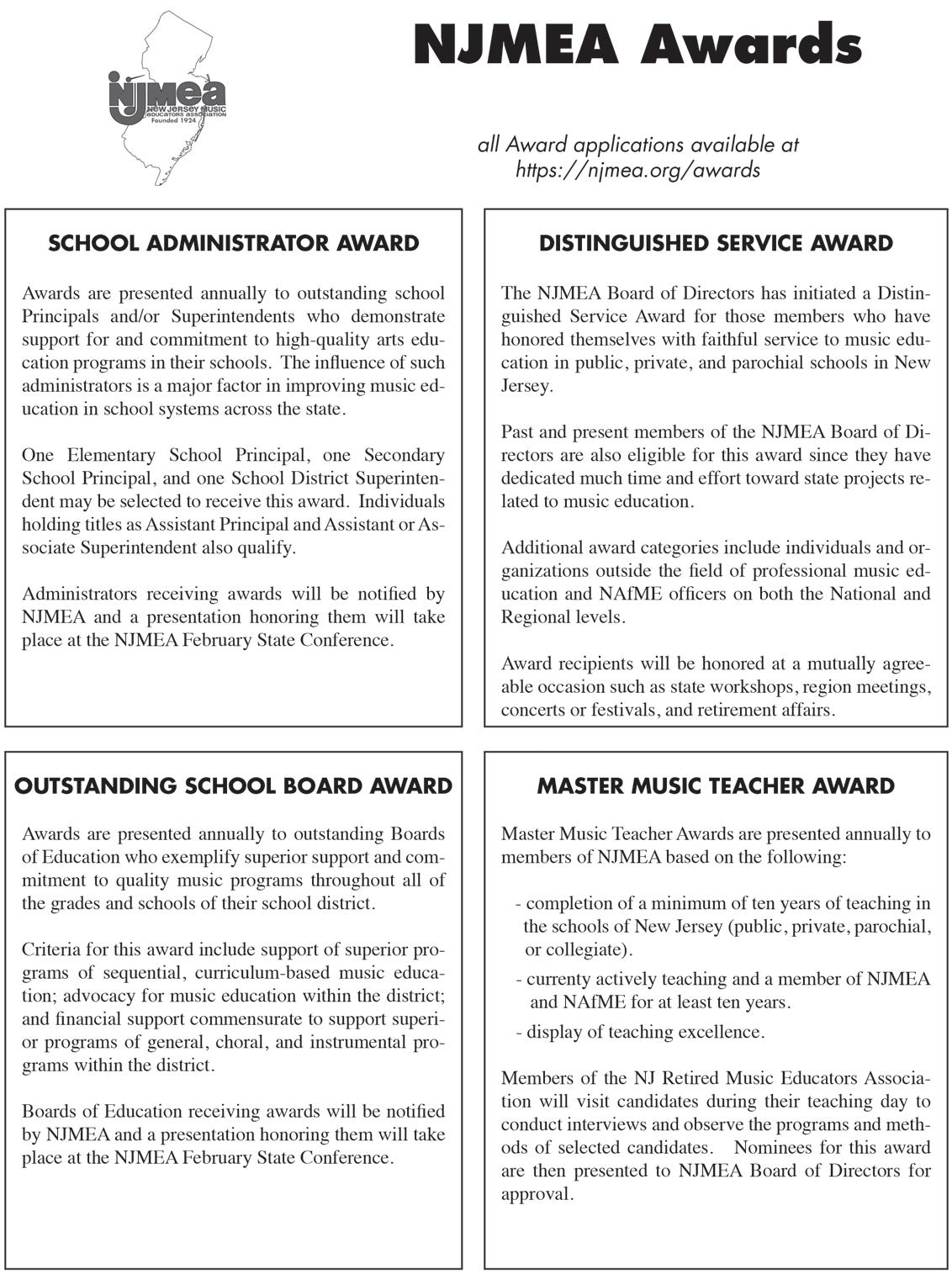
2023: October 26 November 16 2024: February 15 April 11




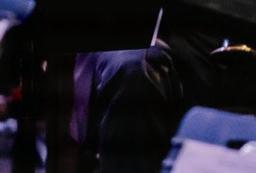
Audition Dates: 2023: November 17

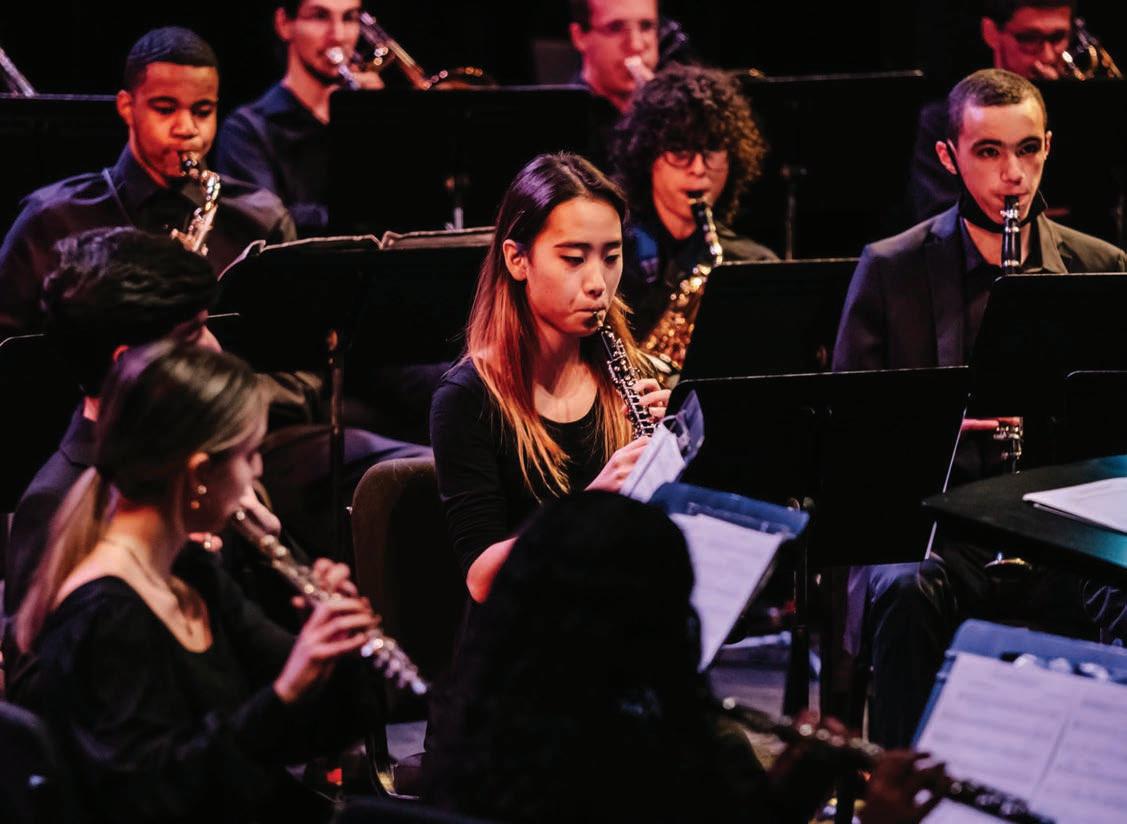
2024: January 26 February 9 March 8 April 12
Register: wpunj.edu/MM4Day To

973.720.2315 | WPUNJ.EDU/MUSIC | WAYNE, NEW JERSEY Pursue Your Career in MUSIC Undergraduate and Graduate Degree Programs Classical Performance, Jazz Studies, Music Education, Music and Entertainment Industries, Popular Music, Sound Engineering Graduate Certificates in Jazz Pedagogy and Orff Schulwerk • World-Renowned Faculty • Beautiful Campus • Close Proximity to New York City @WPMusicDept /WPUMusicDepartment @WPMusicDept WPUNJ.EDU/Music AT Be a Music Major for a Day!
Schedule
or
musicadmissions@wpunj.edu 973.720.3466
Your Tour
Audition
TRAINING THE CREATIVE LEADERS OF
RESIDENCIES OPEN TO THE COMMUNITY FREE!
TOMORROW

Performance
Music Education Composition
Music Therapy
Jazz Studies
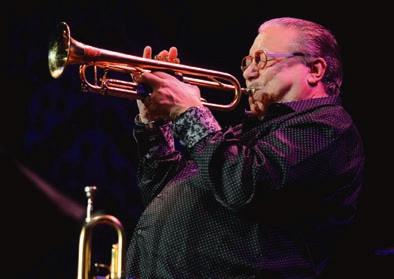
NEW: Recording Arts + Production
An exceptional artistic and academic education
Mentorship by internationally acclaimed artists, educators, and scholars

CALI IMMERSIVE RESIDENCY PROGRAM
AT MONTCLAIR STATE UNIVERSITY
Join us for our third annual re-imagined professional residency program at the John J. Cali School of Music. The week-long residencies include a rotation of seven toprated artists and ensembles. Each residency will contribute to an ongoing exploration of the ever-changing landscape of music today, introducing students to a future that will be, at times, less traditional. Through the multiple opportunities to learn and collaborate with guest artists, Cali students will broaden their understanding of their future musical careers.
TIME FOR THREE
Inspiration and preparation to serve the community and enrich society using the transformative power of music

Developing musicianship and professional skills in ensembles, masterclasses, clinical experiences, internships, and teaching
Experiencing the cultural riches of New York City nearby
DEGREES
Bachelor of Music, Bachelor of Arts, Master of Music, Master of Arts, Artist’s Diploma
Music Education, Performance, Jazz Studies, Music Therapy, Theory/Composition
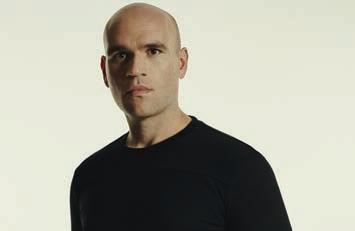
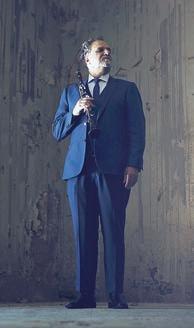
Graduate String Quartet Residency Program



MONTCLAIR.EDU/MUSIC

TEMPO OCTOBER 2023
VIJAY GUPTA
ERIC WHITACRE
DAVID KRAKAUER
ARTURO SANDOVAL
PAOLA PRESTINI
LARA DOWNES
MICHAEL FABIANO
NJMEA 2023-2025 Board of Directors
EXECUTIVE BOARD
President
David Westawski


Past President
Wayne Mallette
West Windsor-Plainsboro High School South westawski.njmea[at]gmail.com
Scotch Palins-Fanwood District mallette.njmea[at]gmail.com
President-Elect
Yale Snyder Monroe Township District snyder.njmea[at]gmail.com
NJSMA, President Anthony Lanzerotti Woodrow Wilson MS president[at]njsma.com
CJMEA, President Brian Williams Robbinsville HS brianwilliamsemail[at]gmail.com
Executive Director William McDevitt Retired wmcdevittnjmea[at]gmail.com




SJCDA, President Cristin Introcaso Collingswood HS cintrocaso[at]collsk12.org
NJMEA Board of Directors APPOINTED MEMBERS




Accessible Music Education
Maureen Butler Retired maureenbutlermusic[at]gmail.com
Administration/Advocacy
Alfred Hadinger North Plainfield alfred_hadinger[at]nplainfield.org
Band Festivals/NJEA Liaison
Nancy Clasen Lodi Public Schools nancyclasen[at]gmail.com




Band Performance
Patrick O'Keefe Absegami High School patrickaokeefe[at]gmail.com
Choral Festivals
Donna Marie Berchtold Retired firesongwed[at]gmail.com
Choral Performance
Brian Williams Robbinsville High School brianwilliamsemail[at]gmail.com
Chorus/Orchestra/Jazz
Joseph Cantaffa Howell High School jcantaffahhs[at]hotmail.com
Conferences
Marie Malara Retired malara97[at]aol.com
D.E.I.A
Isaiah C. Mason Linwood School deia.njmea[at]gmail.com


Emerging Ensembles
Zach Gates East Brunswick High School zacharygatesmusic[at]gmail.com
SJBODA, President Sue Mark Rosa International MS smark[at]chclc.org
Higher Ed./Research/Collegiate


Preston Williams


Westminster Choir College gpwilson[at]rider.edu
K-12 Ed Tech/Secondary General Shawna Longo Westfield Public Schools shawnalongo[at]gmail.com



Orchestra Performance/Festivals
Susan Meuse Hammarskjold Middle School susanmeuse[at]gmail.com
PreK-8 General Music
Amy Burns Far Hills Country Day School aburns[at]fhcds.org
Retired Members/Mentorship
Kathy Spadafino
Retired kspadeb[at]aol.com
OCTOBER 2023 59 TEMPO
GENERAL ADVERTISING RATES
Note: Additional fees will apply if metal plates are required. Ads which exceed the specified sizes will be charged at next ad size.
EDITORIAL POLICY
Articles may be submitted to the editor of this magazine by anyone who wishes to write about topics related to music or music education. All articles which are selected for publication will be proof read for content, spelling and grammatical errors. Authors who submit an article to TEMPO Magazine for publication agree to all of the following
1. the editor may edit all articles for content, spelling and grammar.
2. the printing of the article in TEMPO Magazine, the printing date, and placement are at the discretion of the editor.
3. permission is granted to reprint the same article in any National or State Music Education Association magazine on the condition that the author’s name and TEMPO Magazine are to be mentioned in all reprinted articles.

4. no exceptions will be made regarding items 1 through 3 above.
5. the author of the article may submit his/her article to additional magazines for publication.
NJMEA Past Presidents
1924 - 1926 Josephine Duke
1926 - 1930 R.W. Laslett Smith
1930 - Jay W. Fay
1930 - 1931 Wilbert B. Hitchner
1931 - 1933 Thomas Wilson
1933 - 1935 John H. Jaquish
1935 - 1936 Clifford Demarest
1936 - 1938 Mable E. Bray
1938 - 1939 Paul H. Oliver
1939 - 1941 K. Elizabeth Ingles
1941 - 1942 Arthur E. Ward
1942 - 1944 John T. Nicholson
1944 - 1945 Frances Allan-Allen
1945 - 1947 Philip Gordon
1947 - 1949 Violet Johnson
1949 - 1951 Samuel W. Peck
1951 - 1953 Janet G. Gleason
1953 - 1955 Henry Zimmerman
1955 - 1957 Agnes B. Gordown
1957 - 1959 Leroy B. Lenox
1959 - 1961 Elizabeth R. Wood
1961 - 1963 Harold A. Brown
1963 - 1965 E. Brock Griffith
1965 - 1967 Robert C. Heath
1967 - 1969 Edward Brown
1969 - 1971 Rudolph Kreutzer
1971 - 1973 Charles Wertman
1973 - 1975 Stephen M. Clarke
1975 - 1977
Herman L. Dash
1977 - 1979 Buddy S. Ajalat
1979 - 1981 Alyn J. Heim
1981 - 1983
1983 - 1985
Robert Marince
Anthony Guerere
1985 - 1987 Joan Policastro
1987 - 1989 Joseph Mello
1989 - 1991 Dorian Parreott
1991 - 1993 David S. Jones
1993 - 1995 Anthony Guerere
1995 - 1997 Sharon Strack
1997 -1999 Chic Hansen
1999 -2001 Joseph Mello
2001 - 2003 Nicholas Santoro
2003 - 2005 Frank Phillips
2005 - 2007 Joseph Akinskas
2007 - 2009 Robert Frampton
2009 - 2011 William McDevitt
2011 - 2013 Keith Hodgson
2013 - 2015 Joseph Jacobs
2015 - 2017 William McDevitt
2017 -2019Jeffrey Santoro
2019 - 2021 Patrick O'Keefe
2021 - 2023 Wayne Mallette
TEMPO 60 OCTOBER 2023
All Measurements In Inches 1color or black/white 4 color Full Page (7.5 x 10) $350.00 $800.00 Two Thirds Page (7.125 x 6.66 or 4.625 x 10) $290.00 $790.00 Half Page Horizontal (7.5 x 5) $235.00 $735.00 One Third Page (2.5 x 10 or 4.625 x 5 or 7.125 x 3.33) $175.00 $675.00 One Sixth Page (2.25 x 5 or 4.625 x 2.5) $120.00 $620.00


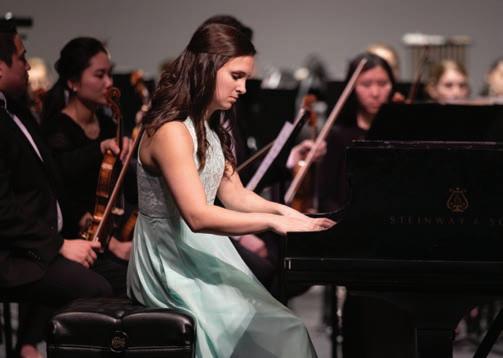
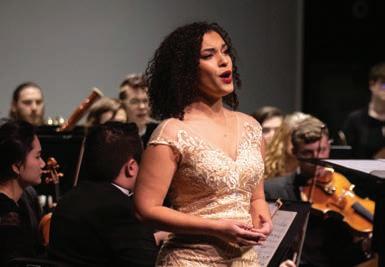
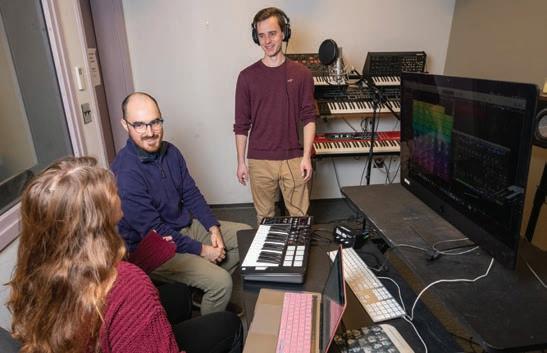
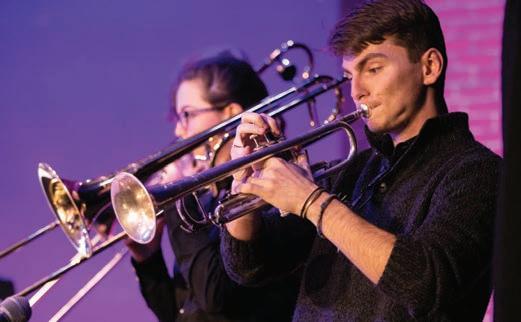


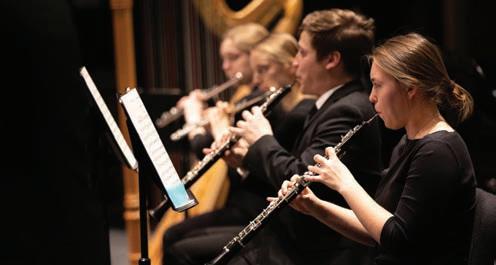
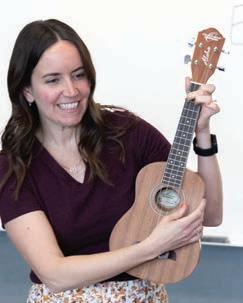

OCTOBER 2023 61 TEMPO AT WEST CHESTER UNIVERSITY musicinfo@wcupa.edu | wcupa.edu/music scan here for more info SUPPORTIVE INCLUSIVE EXCEPTIONAL
TEMPO 62 OCTOBER 2023 Berklee berklee.edu/music-education 37 Calderone School of Music calderoneschoolofmusic.com 17 Caldwell University caldwell.edu 13 Gettysburg College www.gettysburg.edu/music 33 Messiah University messiah.edu/gradmusic 64 Millersville millersville.edu/music 41 Montclair State University, Cali School of Music montclair.edu/music 58 Music is Elementary www.musiciselementary.com 33 New Jersey Symphony njsymphony.org 46 NJAJE State Jazz Conference www.njaje.org 7 Performing Arts Consultants www.usafest.org 63 Peripole www.peripole.com 27 Susquehanna University susqu.edu/music 19 Temple University, Boyer College of Music and Dance boyer.temple.edu 48 The College of New Jersey music.tcnj.edu 2 West Chester University - Wells School wcupa.edu/music 61 William Paterson University wpunj.edu/music 57
ADVERTISER WEB ADDRESS PAGE
ADVERTISERS INDEX Please Support Our TEMPO Advertisers

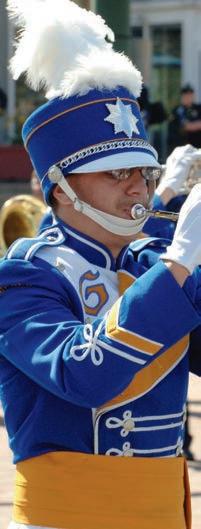

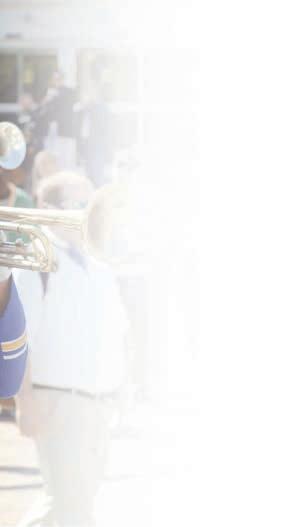


















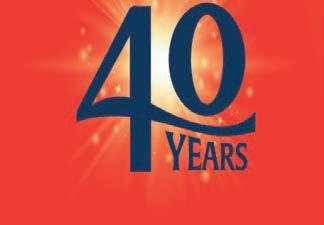
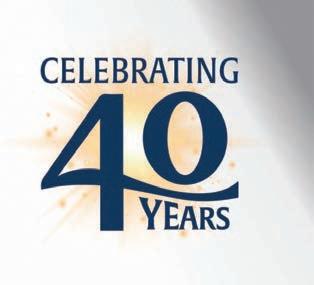
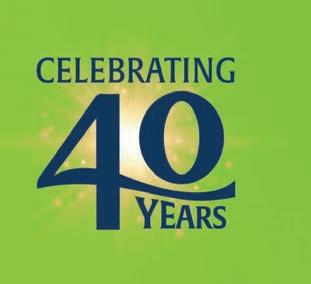

OCTOBER 2023 63 TEMPO PERFORMANCE CRUISES SAILING TO: Bahamas Caribbean Hawaii Key West Mexico Bermuda Alaska Europe NOW BOOKING FOR 2024! Plan your next trip today! TOP202 4 DESTINATIONS: NEW YORK, NY NORFOLK, VA VIRGINIA BEACH, VA WASHINGTON, DC TORONTO, CANADA ORLANDO, FL AND MORE... ATLANTA, GA BOSTON, MA CHARLESTON, SC CHICAGO, IL GATLINBURG, TN NASHVILLE, TN NEW ORLEANS, LA 20 24 PARADE PROGRAMS : MACY'S THANKSGIVING DAY PARADE New York, NY PARADE OF NATIONS Norfolk, VA DISNEY PARADES Orlando, FL & Anaheim, CA TOURNAMENT OF ROSES PARADE Pasadena, CA AMERICA'S HOMETOWN THANKSGIVING CELEBRATION Plymouth, MA As a leader in the student travel industry for over 40 years, Performing Arts Consultants exceeds expectations for student and performance group travel. We will work with you to plan an exceptional, worry-free experience and provide impeccable customer service from start to finish. Learn more at www.usafest.org. Let us put our 40 years of student music travel experience to work for you! Contact us Today: 800-872-3378 | www.USAfest.org 807 Mantoloking Road, Suite 100, Brick, NJ 08723
Earn your
master’s
Music Conducting or Music Education
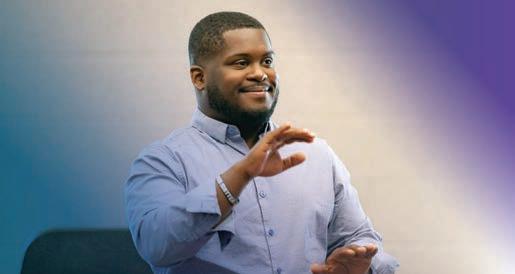
Messiah University’s Graduate Program in Music is designed for busy music educators who would like to advance their career and education. Whether you are a public or private school educator, a community or church ensemble director, or a recent music major graduate, our program can help you develop your skills as a music educator or deepen your expertise in music conducting.
• NASM-accredited
• Predominantly online
• 1-week, on-campus summer intensive course (optional for MME)
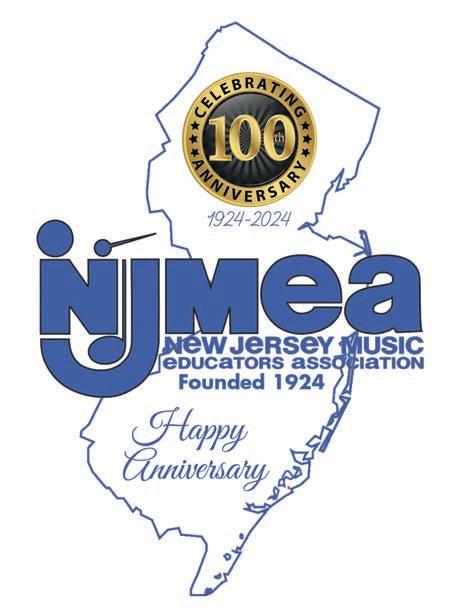
• Faculty are experienced music educators and conductors
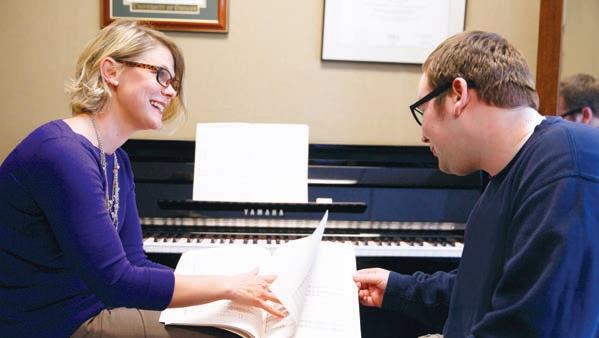
• Conducting degree tracks: choral, orchestral, wind

TEMPO 64 OCTOBER 2023 COLLEGE CONSENSUS IN THE U.S. Best Online Christian Colleges 25top
the academic distinction of a nationally ranked Christian university.
online
Experience
degree in
messiah.edu/gradmusic Online | Flexible | Affordable APPLY TODAY




































































































































































































































































